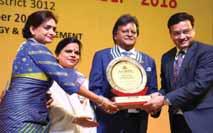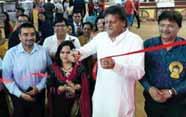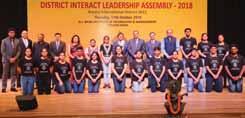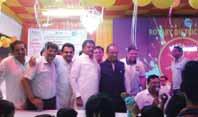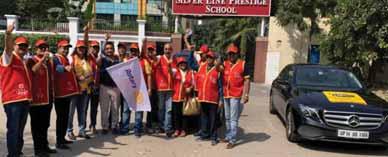



















































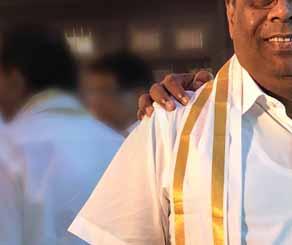




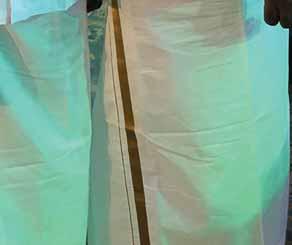

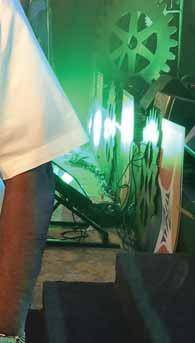

Convener RI Director C Basker and Chairman PDG
12 Be the Flamingos of Change: Barry Rassin
RI President Barry Rassin urges Rotarians to dare to dream to be different in order to make Rotary strong.
22 Rebuilding Kerala
Appeal to Rotarians to give generously, and rope in CSR funds, to help rebuild homes of the flood victims of Kerala and Coorg.
26 Spotlight on new initiatives, more comprehensive training in our zones: Basker
RID C Basker sums up various initiatives undertaken in Zones 4, 5 and 6A.
32 Three past presidents felicitate RIPN Gupta
Past RI Presidents Kalyan Banerjee, Rajendra K Saboo and K R Ravindran celebrate the nomination of Sushil Gupta as RI President 2020–21.
44 Rotary in India ready for a quantum leap
The Chennai Zone Institute and his home district felicitate RIPN Sushil Gupta.
54 India’s robust contribution to TRF continues
The generosity of Indian Rotarians has ensured the second position for India in TRF giving, for third consecutive year.
60 RC Colombo turns 90, with an elegant birthday bash
RI President Barry Rassin celebrates with Sri Lankan Rotarians the 90th birthday of RC Colombo.








72 Burns survivors get a second life
RC Coimbatore Metropolis enables a new life for burns survivors through corrective surgeries.

On the cover: RI President Nominee Sushil Gupta and Vinita being felicitated at the Chennai Institute by RI President Barry Rassin and Esther.
Picture by Rasheeda Bhagat
26

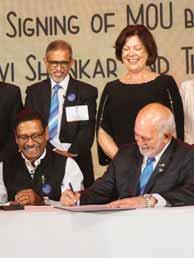


32

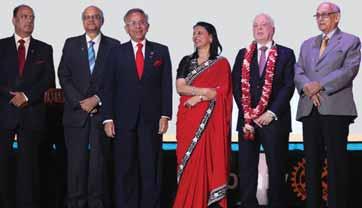
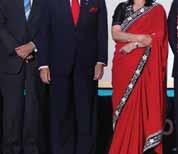

Caparas’ high praise for Rotary
First, congratulations to Sushil (Gupta), whose nomination is now official. I need not tell you how pleased I am to have a governor of my year called to the presidency. I am even more pleased that your current activity is actual service to people near at hand who need it, and show visually the benefit it brings. I hope such all-embracing service will get much impetus and success in your year as Rotarians strive for world peace through friendly service to others.
I also want to join in the expression of great thanks and admiration for the couple Ravi Shankar and Paola Dakoju for their magnificent gift of $14.7 million to our Foundation. Some may wonder who persuaded them to give away such a big amount. What surely influenced the couple’s decision was what they saw Rotary and Rotarians do — acts
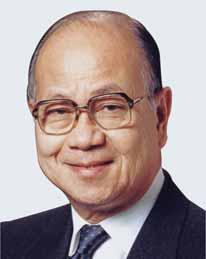
of kindness with heart-warming results that they found fully deserving of what help they could give. Their generosity was won by the admirable state of Rotary in the country to which its premier leaders — you guys — have brought it. Congratulations! But I suggest proper recognition be given also to Rotary News, which gave Rotary work the transparency and honesty that marvellous donors appreciated. That magazine has continually improved these last three years with the new Editor, who deserves much praise. As an organ of our organisation, Rotary News may have already become better than our official magazine.
Mat Caparas Past RI President (1986–87) Philippines

TRotarians help Kerala
he article Rotary swings into action to help Kerala by Jaishree narrates the shocking plight of people hit by the devastating floods and Rotary’s gesture in overcoming such a dreadful situation. It is heartening to note that Rotary was the first among the NGOs to deliver food packets, water bottles and clothes to the helpless victims.
Rotary’s role in polio eradication is praiseworthy; the story of Chetna from a middle class family in Mumbai, who started The Mann Deshi Mahila Sahakari Bank, is a motivating one told by RI Director C Basker.
Best practices for successful clubs by Aadesh Sikehi can be followed by clubs for their better performance. The write-up A park where children can touch, feel and learn at Mankada is really a novel idea adaptable by any club. Rotarians from Raigarh steel city’s campaign against child marriage is a noble deed.
Other articles such as From a stump to a hand, Time Rotary takes on the TB challenge, and Promote gender equity and build resilience in communities: Helen Clark are all worth reading. Thanks for the good effort by the Editorial team.
MT Philip, RC Trivandrum Suburban — D 3211
(This letter was written by Past President Caparas to a few senior Rotary leaders in India on Oct 4)
Rotarians are the first to rush to the disaster site and provide relief material to the victims even before the arrival of any government agency. Rotarians from Districts 3201, 3202 and 3211 have done great work in Kerala. The article The Wada-Paav Miracle! turns the spotlight on how the beneficiaries are leading a normal life after being fitted with LN-4 hand. Hats-off to members of RC Poona Downtown which has successfully executed artificial limb camps in Maharashtra, Madhya Pradesh, Gujarat, Rajasthan, Tamil Nadu, Bihar, Karnataka, UP, Telangana and Kashmir, among other places.
The project ( A floating home for flood victims ) done by RC Dispur, a club with just 21 members in Assam, is excellent. As the project will serve the people living in Majuli, a river island 340 km from Guwahati, during floods, my hearty thanks to the district governor and the club for conceiving such a useful project for the community.
S Muniandi, RC Dindigul Fort — D 3000
Iwas impressed by the activities of RC Navi Mumbai, D 3142, as it is a thoughtful gesture to gift food coupons to visiting dignitaries, get these signed by them and provide the coupons to the needy people. Planting trees and maintaining them is an excellent way of protecting nature. Renting out club premises to other clubs is also an innovative, income-generating idea. All clubs should emulate their practical way of doing service to the society. Hope we will get to see more articles on the novel projects of other clubs.
Sobhana Narayanan
RC Kalamassery — D 3201
The cover page caption Restoring confidence is wonderful. Initially, I thought this picture belongs to my home town club project. For RC Berhampur East has recently taken up an LN-4 project in collaboration with RC Poona Downtown. It was one of the best service projects and beneficiaries came from all over Odisha and neighbouring State of Andhra Pradesh.
Polio eradication is our dream and today most of the countries
report zero polio cases. Congrats to visionary Rotary leaders. Rotarians with big heart swing into action to help Kerala flood victims. This shows our timely action to serve humanity. All the articles are informative and inspiring. Rotarians always say: “See good, think good, do good” to serve people globally.
PRN Chandra Mouli
RC Berhampur Midtown — D 3262
Iread the article Salem Rotarians reach out to an orphanage in Pattaya with interest. Members of RC Salem Young Town have done a good job of helping 150 orphanage children at Pattaya in Thailand with a donation of ` 50,000 and also giving notebooks and uniforms valued at ` 1 lakh at Kilinochchi town in Jaffna, both worthy projects.
Generally, Rotarians used to go to Pattaya and Sri Lanka mainly for tourism, visiting local Rotary clubs, attending their meetings and exchanging flags. But this club has done an innovative job of helping the poor children at the orphanage.
S Mohan, RC Madurai West — D 3000
The article Books by chance written by Sandhya Rao captured my imagination and revived my memory of reading the book The Search in Secret India by Paul Brunton several years back. I was captured by the content of the book with wonderful feelings and wishful thoughts of the silent sage Ramana Maharishi. After reading this piece, I have got an
urge to procure a copy of Somerset Maugham’s A Razor’s Edge . Hope I will be able to fulfil my desire. My heartfelt thanks to you and through you to Sandhya Rao for the article which has touched my heart.
Deepak Agarwal
RC Siliguri Midtown — D 3240
We are happy to read the article Giving them limbs on our signature project in the September issue. The write-up has given a morale boost, especially to the recently joined Rotarians who have understood the magnitude of our project.
Suresh Gokuldas
RC Coimbatore Midtown — D 3201
Icongratulate you and your team for publishing a magazine with quality articles, cover photos on Rotary projects and letters from miracle makers. I was thrilled reading Shakti Sinha’s article regarding our former PM Atal Behari Vajpayee, an affable politician, a generous and farsighted person.
Daniel Chittilappilly
RC Kaloor — D 3201
From a non-Rotarian
I had the opportunity to read about the good work being done by Rotary in Rotary Samachar and want to become a Rotarian. Please tell me how I can become one.
Deodass Daraganj (Allahabad)
We welcome your feedback. Write to the Editor: rotarynews@rosaonline.org; rushbhagat@gmail.com
RI Dist 2981 DG S Piraiyon
RI Dist 2982 DG Nirmal Prakash A
RI Dist 3000 DG RVN Kannan
RI Dist 3011 DG Vinay Bhatia
RI Dist 3012 DG Subhash Jain
RI Dist 3020 DG Guddati Viswanadh
RI Dist 3030 DG Rajiv Sharma
RI Dist 3040 DG Gustad Anklesaria
RI Dist 3053 DG Priyesh Bhandari
RI Dist 3054 DG Neeraj Sogani
RI Dist 3060 DG Pinky Patel
RI Dist 3070 DG Barjesh Singhal
RI Dist 3080 DG Praveen Chander Goyal
RI Dist 3090 DG Dr Vishwa Bandhu Dixit
RI Dist 3100 DG Deepak Jain
RI Dist 3110 DG Arun Kumar Jain
RI Dist 3120 DG Stuti Agrawal
RI Dist 3131 DG Dr Shailesh Palekar
RI Dist 3132 DG Vishnu S Mondhe
RI Dist 3141 DG Shashi Sharma
RI Dist 3142 DG Dr Ashes Ganguly
RI Dist 3150 DG Ramesh Vangala
RI Dist 3160 DG Konidala Muni Girish
RI Dist 3170 DG Ravikiran Janradan Kulkarni
RI Dist 3181 DG Rohinath P
RI Dist 3182 DG Abhinandan A Shetty
RI Dist 3190 DG Suresh Hari S
RI Dist 3201 DG A Venkatachalapathy
RI Dist 3202 DG Dr E K Ummer
RI Dist 3211 DG E K Luke
RI Dist 3212 DG K Raja Gopalan
RI Dist 3231 DG C R Chandra Bob
RI Dist 3232 DG Babu Peram
RI Dist 3240 DG Dr Sayantan Gupta
RI Dist 3250 DG Kumar Prasad Sinha
RI Dist 3261 DG Nikhilesh M Trivedi
RI Dist 3262 DG Bhabani Prasad Chowdhury
RI Dist 3291 DG Mukul Sinha
Printed by P T Prabhakar at Rasi Graphics Pvt Ltd, 40, Peters Road, Royapettah, Chennai - 600 014, India, and published by P T Prabhakar on behalf of Rotary News Trust from Dugar Towers, 3rd Flr, 34, Marshalls Road, Egmore, Chennai 600 008. Editor: Rasheeda Bhagat.
Board of Permanent Trustees & Executive Committee
PRIP Rajendra K Saboo RI Dist 3080
PRIP Kalyan Banerjee RI Dist 3060
PRID Sudarshan Agarwal RI Dist 3011
PRID Panduranga Setty RI Dist 3190
PRID Sushil Gupta RI Dist 3011
PRID Ashok Mahajan RI Dist 3141
PRID Yash Pal Das RI Dist 3080
PRID Shekhar Mehta RI Dist 3291
PRID P T Prabhakar RI Dist 3232
PRID Dr Manoj D Desai RI Dist 3060
RID C Basker RI Dist 3000
TRF Trustee Gulam A Vahanvaty RI Dist 3141
RIDE Dr Bharat Pandya RI Dist 3141
RIDE Kamal Sanghvi RI Dist 3250
Executive Committee Members (2018–19)
DG Rajiv Sharma RI Dist 3030
Chair – Governors Council
DG Pinky Patel RI Dist 3060
Secretary – Governors Council
DG Subhash Jain RI Dist 3012
Secretary – Executive Committee
DG A Venkatachalapathy RI Dist 3201
Treasurer – Executive Committee
DG Shashi Sharma RI Dist 3141
Member – Advisory Committee
ROTARY NEWS / ROTARY SAMACHAR Editor Rasheeda Bhagat Senior Assistant Editor Jaishree Padmanabhan
Send all correspondence and subscriptions to
ROTARY NEWS TRUST
3rd Floor, Dugar Towers, 34 Marshalls Road, Egmore Chennai 600 008, India. Phone : 044 42145666
e-mail: rotarynews@rosaonline.org Website : www.rotarynewsonline.org
The views expressed by contributors are not necessarily those of the Editor orTrustees of Rotary NewsTrust (RNT) or Rotary International (RI). No liability can be accepted for any loss arising from editorial or advertisement content. Contributions – original content – are welcome but the Editor reserves the right to edit for clarity or length. Content can be reproduced, but with permission from RNT

If the barometer of any Zone Institute is the level of the gung-ho mood in the participants, then the Chennai Institute with the theme Passion to Serve notches up a very high score. Whether it was RI or Rotary’s leadership in the zone, led by RI President Barry Rassin himself representing the former and the latter led by Past RI Presidents Rajendra K Saboo and K R Ravindran, RI Director C Basker, TRF Trustee Gulam Vahanvaty and RIDEs Bharat Pandya and Kamal Sanghvi, the incoming Governors, the trainers and other RI officers who participated, the mood was infectiously positive and optimistic. And the single-most important reason for this was the buzz on everyone’s lips…the unbelievably generous donation of `100 crore ($14.7 million at the conversion rate on July 1, 2018) by RC Bangalore Orchards President D Ravi Shankar and Paola. The couple, who were given a grand reception and honoured at the Institute, were the cynosure of all eyes, and by his simplicity and candidness, in a question-answer session with D 3190 DG Suresh Hari, the person who persuaded him to make this stunning donation, Ravi Shankar conquered many hearts at the Institute.
This donation, which is the talk of the entire Rotary world — PRIP Mat Caparas also mentions it (see the Letters column) — set the tone at the TRF dinner held to honour major benefactors of the Foundation. President Rassin, Director Basker and Trustee Vahanvaty said that this shot in the arm would help motivate other Rotarians to give to TRF, keep India’s head held high, and in a chain effect help improve thousands of lives
across the globe in areas of health and nutrition, water and sanitation, literacy, livelihood etc.
Whether it was the quality of training, frank and serious talk (some of it in the popular Frankly Speaking session moderated by PRIP Ravindran, see Page 16), the ease and comfort with which the participants asked some tough questions to their leaders at various sessions, or the fun and music at Chennai Nite, the Institute Committee led by PDG and Convener ISAK Nazar, pulled out all stops to make this Institute a memorable one.
The icing on the cake was the grand reception accorded to RIPN Sushil Gupta and Vinita, who came straight from their intensive training session at Evanston after “drinking from a fire hose”, as Gupta jocularly remarked (Pg 47), to get blessings from Lord Venkateswara through an archana performed in Tirupathi and the prasad delivered in Chennai.
That Rotary is at its best while doing service to the community it inhabits was aptly demonstrated by Director Basker who spared no opportunity to request the DGs, DGEs, and other leaders assembled, that they keep their hearts open to help rebuild the homes of those rendered homeless in the devastating flood that battered Kerala and parts of Karnataka. Under the chairmanship of PRIP Kalyan Banerjee, who has rich experience in rebuilding low-cost shelters after the Bhuj earthquake, a committee has been formed to oversee the reconstruction work in these districts. Yet another huge opportunity for Rotary to leave its mark on the community, but for that your generosity is essential…
Rasheeda Bhagat

Dear fellow Rotarians,
ne early June, more than 30 years ago, I had a business trip scheduled to Las Vegas. I had been a Rotarian for about six years, and I thought of myself as an active member: I attended every meeting, I’d served as club secretary, I knew everyone in my club. But for me, Rotary was very much a community organisation. It connected me to Nassau and perhaps even to the Bahamas — but no farther.
I had never given much thought to Rotary beyond the Bahamas, and it had never crossed my mind to travel to a Rotary convention. But that spring, I realised that my trip to Las Vegas would coincide with the Rotary International Convention and thought, why not? I sent in my registration and paid my fees, never suspecting that the experience would change my life.
When I walked through the doors of that convention, I was stunned. It was one thing to know that I was part of a global organisation with over a million members around the world. It was something else altogether to stand there in the middle of it. I went to every general session, looked in at every booth at the House of Friendship, and learned about projects that I hadn’t even known you could do in Rotary. That convention didn’t just open my eyes. It opened my
mind. It inspired me to completely change the way I saw Rotary, what Rotary could do for me, and what I could do through Rotary. That inspiration has stayed with me ever since — and is renewed every year, at every Rotary convention.
In June 2019, Rotarians from all over the world will converge in Hamburg to Capture the Moment at the 110th Rotary International Convention. Many, like me, will have been coming to conventions for years; many others will be coming for the first time. Whether they’re looking to connect with old friends, to find inspiration for a new Rotary year, or simply to see what Rotary is all about, each of them will find their own moment in Hamburg.
Hamburg is a port city that connects Germany to the world and that has been an economic and cultural hub for centuries. It’s a wonderful place to visit — to stroll the shores of the city’s lake, take a boat trip on the Elbe River, dine out, hear great music, and explore fascinating museums. It’s also the ideal place to kick off a European vacation.
If you’re a regular convention goer, you absolutely won’t want to miss out on the friendship and inspiration you’ll find in Hamburg. And if you’ve never been to a convention, please consider this my personal invitation. Register at riconvention. org by December 15 for the best rate — and let this convention Be the Inspiration for your Rotary journey.
Barry Rassin President, Rotary International

Dear Rotarians,
Perhaps the reason it feels so good to give is that we know, deep down, that even random acts of kindness can change the world.
I am happy and wish to congratulate Rtn Dakoju Ravi Shankar for his contribution of ` 100 crore to TRF. When asked about his contribution to TRF, Ravi Shankar said he did not think of any record, or any honour or have any strategy in mind. “I simply decided to give”. What a wonderful attitude and benevolent philosophy. Ravi Shankar: you truly are an inspiration to all Rotarians.
Ted Turner, the former owner of CNN, gave a donation of $1 billion to a UN Foundation. In a TV interview he told Larry King that he has discovered “the more good I do, the more money has come in. You have to learn to give. You’re not born to give. You’re born selfish. I’ve never been happier than I am today.’’
Let me share a story. A billionaire happened to listen to a discourse from a Swamiji who said, “Everyone in the world is after money only. And they are ignorant that they cannot take money with them after their death.” Hearing these words, the billionaire thought to himself, since this man has no money, he is lecturing like this. The next day the billionaire called his staff and asked them to suggest a way to take his money with him after death. No one had any idea.
Few weeks later, a stranger approached the billionaire and said he has an idea. The billionaire eagerly asked him to share his idea. The stranger asked him how many countries he had visited. The billionaire said almost all countries in the world. The stranger asked him whether he carried Indian rupees to the countries during his visit. The billionaire said he carries money but not in rupees. “I convert rupees to USD when I visit USA and convert rupees to local currencies whenever I visit any other country.” The stranger said you are right and continued: ‘Sir, you want to go to heaven after your death!’ “Yes, yes” said the billionaire. In heaven the name of the currency is called Punya. By giving you can convert your currency to Punya
When one person gives generously, it inspires observers to give generously later. In fact, research has found that altruism can spread by three degrees — from person to person to person to person. “As a result, each person in a network can influence dozens or even hundreds of people, some of whom he or she does not know and has not met.”
Let us salute known and unknown Rotarians, who have contributed to The Rotary Foundation and people like Ravi Shankar who serve as a reminder that each of us has a role to play and we can rise to the challenges of our time and, in our own small way, help to build a better world.
Be the Inspiration in Giving.

C Basker Director, Rotary International


At this moment Rotary is at the crossroads and we need to step up and work to take our organisation in a little different direction towards the future. We’ve been there for 113 years and we need to plan on how we are going to be around for another 113 years. If we don’t do that and plan strategically what we should do to be a
strong organisation in the future, then we may not get there.”
With this introspective note, RI President Barry Rassin kicked off the Rotary Zone Institute for Zones 4, 5, and 6A in Chennai with the theme Passion to Serve
He said for so many years Rotary’s membership was stuck at 1.2 million. In the last two years 300,000
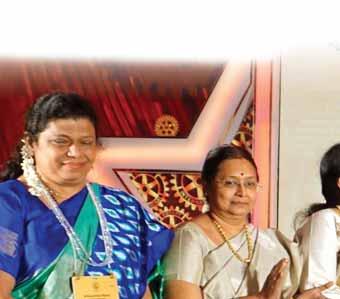

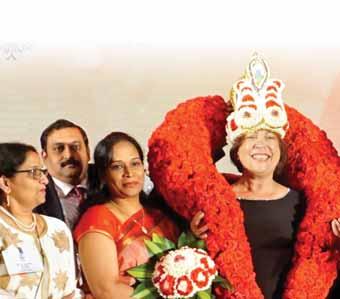
people had joined Rotary and another 300,000 had also left. “That’s shocking and each of us needs to ask why are they leaving Rotary. What is it that our clubs are doing wrong? Is my club giving value to every member? Are we the best thing happening at that day and time in our community? How do we truly represent our community?”
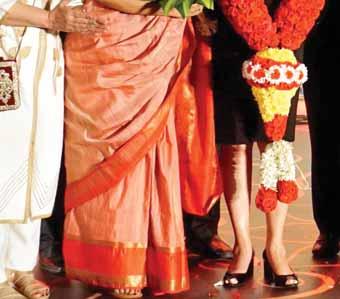

He then drew the attention of the RI officers present at the Institute to the cover picture of the July edition of Rotary News, which carried “two individuals (Rassin and spouse Esther) along with seven flamingos. “In that picture, six flamingos are looking in one direction and the seventh is pointing in the other direction. It is trying to go through the crowd in the other direction. That is the flamingo of change. I must now ask you to be the flamingo of change.”
To be that flamingo of change, they would have to think differently “on who we are, where we are going and what we need to do. How do we convince our clubs that to go in a different direction will be better for both Rotarians and Rotaractors. This is the challenge.”
To be the flamingo of change, Rotarians would have to ask themselves if “we are being transparent and accountable. Is every club in our district showing the numbers as they should be showing? Are we staying away from any perception of misuse of funds or any other kind of misuse? Let not a few people harm the amazing reputation that you have.”
Urging those assembled to take victory and defeat in their stride, Rassin said, “When I first put in my name for RI President’s post, I lost. I had to take a deep breath of disappointment and then congratulate the person who got there. When we lose an election, we need to be the better person, the person who congratulates the winner.”
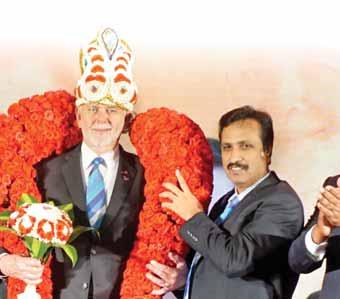
Rotarians in these zones were lucky to have the kind of leadership they had in Director C Basker and other senior Rotary leaders. “The service projects you do in your zones, the literacy programme covering the country, health projects and the water and sanitation programme are among the best.” He had the privilege to see one such WinS project in Chandigarh, where the children “were so happy to show me how they wash their hands. I asked one of them why he was so happy and he said they were having so much fun singing and washing their hands together. And when I go home I’m going to teach my family how to do this. Such impactful
RI President Barry Rassin and Esther being felicitated at the Institute. Also in the picture: Afzalunissa Nazar, Mala, Lalitha Subramanian, DG Babu Peram, RID C Basker, Institute Chairman ISAK Nazar and Secretary N Subramanian.

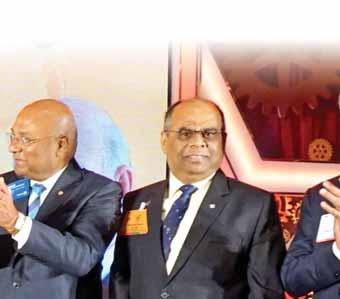
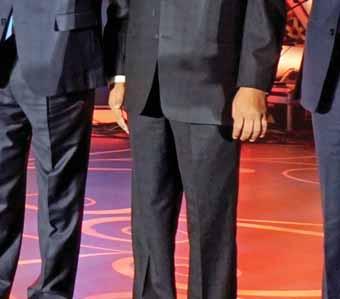

projects are changing behaviour in your region; be proud of what you are accomplishing.”
Then there was the tremendous achievement on polio; despite scepticism Indian Rotarians had helped India become polio-free. “Many said India would be the last country, but you proved them wrong and did everything that you had to do to make it faster than others said could happen. That is due to the leadership you have and I thank you for that.”
Referring to Director Basker’s inaugural address Rassin said, “You are number one in the Rotary world for membership growth and number two for Foundation giving. Last time I was here I challenged all those I came into contact with saying I believe you are going to be number one in Foundation giving. You have already shown growth this year by the
It is shocking that in the last two years
300,000 Rotarians have left Rotary. Each of us needs to ask why are they leaving Rotary.
What is it that our clubs are doing wrong? Is my club giving value to
every club member?
incredible and very generous benefactors we are going to honour today (RC Bangalore Orchards President Ravi Shankar and Paola), truly humble, wonderful people.”
But it was with the growth of Rotaract in these zones that Rassin was most impressed. “The increase (in reporting) from 9 per cent to 72 per cent is a fantastic growth in a short time. Did you see the Rotaract News that just came out? On Page 9 there is a box that shows how many Interactors and Rotaractors you have.” The two interesting numbers were that while there were 257,000 Rotaractors worldwide, those reported were only 145,000. For the 110,000 unreported Rotaractors

around the world, “about whom we don’t have information, all of us are at fault and RI is looking at fixing this at the international level.”
Rassin urged every district to collect that information “so that we can bring our Rotaractors to an equal position with Rotary. They are the future of Rotary and if they join us regularly they will help to reduce our average age. We desperately need our young professionals to see us as relevant for their lives in this day and age. Right now they don’t; so I urge Rotary clubs to ask if we are really representing our communities which our bylaws ask us to do. We should be the microcosm of the entire community and not just a small section. So please identify these young professionals. The opportunity for us to grow is massive if we really work hard and focus on this goal.”
The RI President added that there was an expression in Africa that “when you pick up a rock you touch the past, when you pick a flower you touch the present when you touch a life, you change the future. Imagine how many lives your clubs and districts have touched and changed. You’ve made our world a better place not only here but in countries around the world. You have a strength individually and collectively that no other organisation has. Ensure we use that strength to make change.”
Rassin then proceeded to relate a heartrending story of Daniel, a boy in Haiti, whose life was saved as two Rotarians came together to ensure his heart surgery was performed in time. A few years ago, when he sat on the investment committee of RI with other senior leaders, another member, Greg Paul, told him he was trying to help this child with a heart ailment who

had been given only a few months by doctors. “He told me I am trying to get him to the US for his surgery but can’t get visa. Can you help? I told him we have a Gift of Life programme in Haiti and can do the surgery there itself. So please get me the medical records.”
It was a Wednesday morning, the surgeon, who visited once or twice a month, happened to be in Haiti, saw the medical records by Thursday and said yes, the child’s problem could be fixed and his life could be saved. But as he leaves on Friday night the surgery would need to be done latest by Friday morning. “I got back to Greg saying I need that child Daniel by Thursday night so that the surgery can be done. Daniel, his father, mother and another person got onto a motorcycle — not a Harley Davidson but an ordinary scooter — to drive for 90 minutes to get to the hospital… the child who had been given a few months to live made that journey on a scooter.”
He reached in time, “the surgeon did his job and everything went well. We moved on, as we always do as Rotarians, to some other work on hand.”
are, where we are going and what we need to do. How do we convince
direction, which will be better for both Rotarians and Rotaractors.
A few months later he got a mail with a picture of Daniel “with a footlong scar on his chest. But he had a big smile on his face. He wrote: “I know you helped me, you saved my life. Thank you.”
To save such lives “all we have to do is talk to each other, reach out. I give Daniel’s thanks to you… on his behalf I thank you for all the children you have helped, are helping and will help in the future by providing education, literacy, water and good hygiene, eradicating conflict…”
Pictures by K Vishwanathan


In a session packed with punches and counterpunches, wit, humour, repartee, friendly banter and some hard talk as well, Past RI President K R Ravindran gave the delegates at the Chennai Institute their money’s worth.
In a repeat of last year’s KL Institute session, the second instalment of Frankly Speaking lived up to its star billing, opening to a packed hall. As is the norm at most Rotary events in India, the session was running late
and the moderator Ravindran waved away the bouquet — mercifully he had also asked for the elimination of the AV introductions as everybody in the audience knew the participants — being offered to him saying: “Take away the flowers; I don’t need them!”
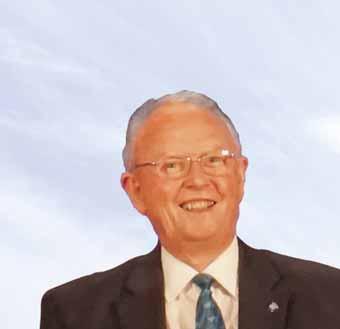
At the outset he said: “Here we’re trying to bring you an RI Boardroom environment and give you a feel of the kind of things that Board members discuss,” adding wryly, “We won’t have questions like when are we going to have a woman president, why not a
Five-Way Test and others related to elections. We’ll have a dialogue on more mature, informative and philosophical issues…”
Throughout the session Ravindran kept pitching googlies, flippers and the odd bouncer to the participants — RI President Barry Rassin, PRIP Rajendra K Saboo and TRF Trustee Mike Webb — with the prelude… ‘this is a very simple question’!
Unfortunately, said Ravindran, PRIP Kalyan Banerjee
From L: TRF Trustee Mike Webb, RI President Barry Rassin and PRIP Rajendra K Saboo.
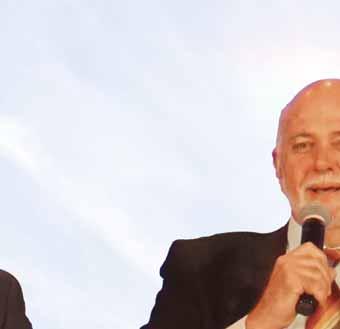




was not able to make it this time and he would be missed.
Two major points that emerged from this dialogue pertained to an admission of the shortcomings in the organisation, articulated by none less than President Rassin himself. While answering a question on the need to bring in more flexibility in conducting meetings, the classification system etc, Rassin said forcefully, “I talk a lot about change, but the one thing I don’t think we should change are our five core values — fellowship, leadership, integrity, diversity and service. That’s who we are as an organisation. Diversity, I believe, is our weakest point; we are not diverse enough in age, gender, classification and race. So we need to really focus on diversity, and without being rigid, every club should represent all professions and different areas
in our community. Then we will succeed in knowing what the real needs of that community are.”
Another “shortcoming” of Rotary was thrown up when Ravindran asked a pointed and blunt question on why awards to DGs are being based only on two criteria… “today our DGs seem to be recognised only on the strength of the money they collect for the Foundation and the members their clubs bring in, even though some of those members may be more comfortable to sit in a roadside garage somewhere.”
Agreeing with him, Rassin said that criteria such as public image, creating the right kind of leadership at the club-level, and service projects should be included in measuring governors’ performance. Ravindran intervened sharply to say: “But Mr President, even at this Institute we didn’t have anybody recognised on the basis of the humanitarian projects they did.”
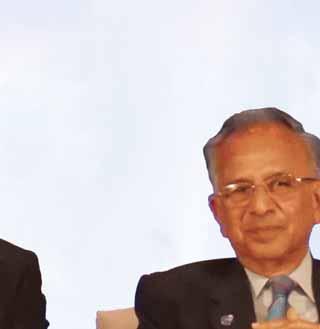
To this PRIP Saboo expressed his concern that when the performance of DGs was measured only on the two criteria of TRF donations and membership, “this leads to malpractices. There must


Diversity, I believe, is our weakest point; we are not diverse enough in age, gender,
RI President Barry Rassin
be some other way of measuring the performance of DGs, such as the hours they spend in the activities of the districts, how punctual they are in bringing out the monthly letters, etc.”
Agreeing, TRF Trustee Mike Webb said apart from the hours spent in service to the community, another measure of the DGs’ performance should be the amount or percentage of the DDF (district designated fund) they spend during their year, as also how seriously they engage with My Rotary , and the number of hours given in Rotary service to the community. “They need to use 100 per cent of the DDF amount in their year, because that money was given to be used, it’s not meant to be in the savings bank or to be left to your successor.” Also, the performance of the DGs should be measured in terms of member retention as it was “far more important to do that than get new members,” added Webb.
A barrage of ‘simple questions’ When Ravindran began the session saying he was addressing a “very simple question” to President Barry, the latter said, under his breath, “No question from you is ever simple, my friend!”
Ravindran outlined the preamble to his question thus: first “35 per cent of Rotary membership is now in Asia which includes India, Japan, Taiwan, Korea, Philippines, and 23 per cent

of TRF giving comes from Asia. Each year Price Waterhouse Coopers (PWC) predicts the largest economies in the world by 2050. The present top rankers, based on the size of their economies in terms of GDP, are US, Japan, Germany, France and UK.”
PWC’s projection for the top five economies by 2050 is: Japan at the fifth slot at $6.8 trillion; followed by Indonesia ($7.3T); India ($28.3T); US ($34T) and China at the top slot at $50T.
Why then, he asked “don’t we move Evanston… our headquarters… to Asia?”
Amidst laughter and applause, Rassin responded: “Thank you for that simple question. We are a corporate entity functioning in over 200 countries of the world. If we only looked at Foundation giving and membership then you
Governors need to use 100 per cent of the DDF amount in their year, because that money was given to be used, it’s not meant to be in your savings bank or to be left

TRF Trustee Mike Webb
will have a valid point. But the reality is that when you are a corporate entity operating in so many countries you have to look at the best country which can handle operations in so many countries.” The other criteria were the availability of the best legal services, ease of moving funds from around the world to a central location, and the best tax base.
In a lighter vein, he added, “In fact the Bahamas would fit very well; there is no income tax, and there are laws that allow you to be very flexible with how your funds flow. Maybe the Bahamas is the best place to have our headquarters!”
Trustee Webb added that in an era of such technological advances it didn’t really matter where the Rotary headquarters was located. And moving the headquarters would have financial repercussions in terms of a “huge tax
RI President Barry Rassin and PRIP Rajendra K Saboo being given mementoes by DGs Sayantan Gupta and Barjesh Singhal in the presence of (from L) RID C Basker, DG Rajiv Sharma, PRIP K R
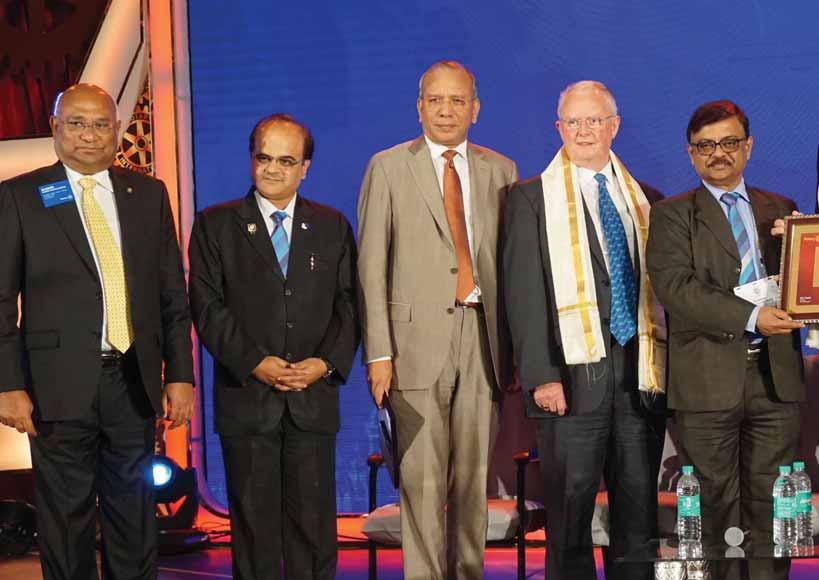
bill because of capital gains on disposing the property we own in Evanston.” Also, Rotary occupied only half of the building at Evanston, the other half was let out and those entities paid a “significant part of the overheads in running that building.” And, the tax benefits that Rotary gets under the Illinois State laws would disappear too.
PRIP Saboo suggested that just as multinationals have autonomous offices in different regions of the world, similarly the Rotary office in India “can have more autonomy rather than becoming just the post office of the headquarters. I see more autonomy coming in the years to come.”
Another problem, added Rassin, would be akin to what the Toastmasters International encountered when they shifted their headquarters from
California to Colorado. This was done to save cost in taxes and other operations but what they didn’t factor in was that they “lost half of their staff in their move, and it took them a significant time to get back to where they started.”
Culture of giving
Ravindran then addressed Trustee Mike Webb, “When you look at the top 20 giving countries to the Foundation last year, with USA at $181million at the top slot and Belgium at $1million, only five European countries have made it to the top 20. This does not gel with the decidedly better standard of living in these western countries.” On the other hand, he added, there were several Asian countries in that list including India (in the second position, having contributed over $19 million).”
Why can’t the European countries with robust economies give more, he asked.


Trustee Webb responded that part of the reason was totally different cultures and different types of tax breaks for donations to charities in different countries. “I’ve made a number of trips to India and Africa; here people can see for themselves what is being done with the money they donate and what difference it is making to the community. Borewells, hospital equipment and the rest that grants do.” In the UK, for example, Rotarians did many global grants with clubs and districts around the world “but unless you make a personal trip you never get to see the results of what your money is doing. And clubs say: ‘Oh, we’re putting more money into the Foundation?’ So linking the GDP to the quantum of giving might not really work!”
Saboo, agreeing with Ravindran, suggested another factor to remember, which was being the purchasing power. “What we are giving is much more compared to the developed countries. We are proud of the fact that we have now become a net giver and are no longer a receiving country. I do hope our friends from Europe will follow our example.”
But this was not to say that there was no generosity among individual Rotarians in Europe, he added, and related a story of how a couple of years ago “I asked a Rotarian friend in Germany to donate $100,000 for Polio and he said, ok, I will give the money but on two conditions. One, stop pestering me to contest for the DG’s post, and my name should not come anywhere. These are cultural differences.”
Not changing fast enough
Ravindran’s preamble to the next question was that over the last 20 years, technology giants such as Google, Apple and Amazon had come


to dominance through the digital marketplace. “In such a scenario is Rotary still stuck in the Paul Harris days?”
Saboo said while this might be true, “Rotary will always be relevant with its values”, and gave the example of Japan and South Korea. Both are technology giants and yet “have retained their own culture and traditions.”
Webb responded that he did find Rotary “stuck in Paul Harris days.” He said at one of the Institute tea-breaks an Indian Rotarian had told him he had recently visited a club in the UK “that had 12 people, the average age was mid -70s and the club president was in his 80s. It had no lady members. Now that club will die; it is still meeting as a friendship club in the same way as it had come together many, many years ago.”
Rassin added that in the last two years while we added 300,000 members, we also lost the same number of Rotarians.
“Statistics say that less than four per cent Rotaractors join Rotary clubs and that is because they don’t find us
relevant for today. In too many places we’re still operating in Paul Harris days and that has to change.” For example, it took four years to even effect change; “most of us don’t have cell phones that old! We need to change much faster.”
There was also a discussion on why Trustees should not be elected just like Directors. “And why do we need a past president as TRF Chair; why can’t we let the best guy to do that job,” asked Ravindran.
Disagreeing, Rassin said the zones were run by the Directors who were elected, “and I believe that the Trustee should be part of the Director’s team.” And yes, a past president need not necessarily become the Trustee Chair; the best man for the job should be selected, opined Rassin.
“So you support such a proposal,” prodded Ravindran, with a twinkle in his eye.
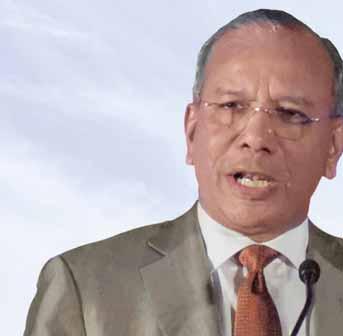

finance, HR, technology, etc for the Trust to operate effectively.
Saboo recalled that there was a proposal in 1992 to elect TRF Trustees and it was “defeated and defeated substantially. Because this is The Rotary Foundation of Rotary International. And it is the RI President who is recognised as the spokesman of the Foundation and the No 1 in the organisation.”
Ravindran said that last year at the KL Institute he had asked PRIP Kalyan Banerjee about the quality of Rotarians we are getting and he had responded that the really top people, such as CEOs of big companies, were not seen in Rotary in India. “What if we increase our dues to $100; membership might actually drop but we would have elite members,” asked Ravindran.
“I would support the discussion on such a proposal,” shot back Rassin.
Trustee Webb felt that Trustees should be appointed and not elected because Trustees needed to have different sets of skills such as

“I would totally disagree with that; and we need to be cautious with it. It is not the (quantum) of dues that cause individuals to lose their integrity; it’s their nature. I would keep the dues as low as we can, allowing us to provide adequate support to the Rotary clubs,” said Rassin.
Saboo’s response: “Your question is loaded; we all realise that it is not the money, but eligibility which is the issue. Our constitutional documents

Why do we need a past president as TRF Chair; why can’t we let the best person to do that job?
Past RI President K R Ravindran
PRIP K R Ravindran
If we realise the importance neglecting now, and get the senior people and leaders in our community, there will be a line-up of people
President

specify eligibility. The problem comes when we are in such a rush to get members, that only after getting them, we start looking at classification! But if we realise the importance of classification that we are neglecting now, and get the senior people and leaders in our community based on the eligibility criteria, there will be a line-up of people who will want to get into Rotary. It is this obsession of increasing membership and get recognition that is wrong.”
He added that diversity, which RI advocated strongly, came through the classification system. On flexibility in meetings, he said Rotary was about relationship and person to person contact which comes through physical meetings. “Just think of having an Institute like this on your computer and trying to reach people, do you think that will generate such unity or solidarity? That comes only through touch, a tap on the back and looking each other in the eye. This relationship is extremely important and it is our strength.”
A certificate for Basker
Was Director C Basker doing a good job, was Ravindran’s next tonguein-cheek salvo, fired at Rassin. “The honest answer,” Rassin responded, “is what I said earlier to the DGEs. I told
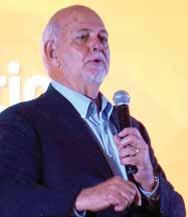
Responding to PRIP K R Ravindran’s query on the best and worst of Rotary that he had seen during his year so far, President Barry Rassin classified it into three different parts — the good, bad and ugly.
The good is the service projects and what we are doing to change the world. Esther and I visited two human milk banks run with Rotary support, where mother’s milk is given to infants who don’t have that benefit, so that they can get nutrition. Then there is a Rotaract project in
one of the islands where waste is recycled and sold to tourists, and this is creating entrepreneurs. It is fantastic work. Those are the great things I love to see. The bad is when I talk to Rotaractors they say that there is no Rotary club that wants them. The ugly part that hurts the most is when I see reports that need to be investigated about funds that we have provided for projects that didn’t get to the project or individuals siphoned off the money. We have to ensure there is adequate punishment for such people. Those elections where we spend hours because somebody was unhappy he didn’t get elected or clubs which don’t exist. Clearly in some places we are not functioning in accordance with the ethics of Rotary. Those are the things that hurt me the most and keep me up at night, and I can’t sleep because I believe that every Rotarian should be ethical at all times.
them Director Basker represents you extremely well and he stays the course where he needs to, and brings in new ideas when required. So I am very glad to serve on the Board with Basker.”
When Saboo intervened to say that while Rassin still needed Basker’s support on the Board for the rest of the year, “I can honestly say that we are proud that Basker is our Director”, Rassin replied: “Not to disagree with my mentor, but I don’t look for loyalty from my directors, I look to them for
making recommendations that are in the best interest of our organisation. And if that means they have to disagree with me, so be it!”
Webb added that as Chair of TRF’s Finance Committee, he represented the Trustees and “I sit on Board meetings and can vouch that when Basker speaks, it is worth listening to because words of wisdom come out.”
Pictures by K Vishwanathan Designed by N Krishnamurthy


Aprominent feature of the Chennai Institute was the sessions dedicated to rebuilding Kerala and Kodagu (Karnataka) which were badly ravaged by torrential rains and flooding in August.
“Congratulations to all Rotarians for rising to the occasion and reaching out to the flood victims at their most important hour of need. Now that the rescue operations are over,
the thrust is on rehabilitation and we have to complete it by June 2019,” said RI Director C Basker.
He said that 38 villages in Coorg district were also badly damaged in the rains. DG Rohinath of District 3181, under which this region falls, thanked the Rotarians for their support. Rotary clubs across the country rushed truckloads of aid in the form of new clothes, drinking water, utensils, groceries,

medicines etc for the people. A committee headed by PDG Ravi Appaji has been formed to construct 750 homes in Coorg, said Rohinath.
The sessions at the Institute discussed ways to fund an ambitious target of constructing 3,000 homes for the flood victims in the three districts — 3211, 3201 and 3202. Soon after the floods, PRIP Kalyan Banerjee had proposed this initiative during his visit to Kerala, and a committee
From L: DG E K Luke, DG E K Ummer, Veena and DG A V Pathy.

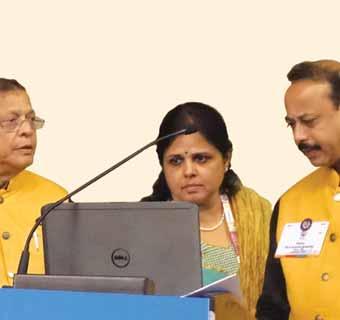


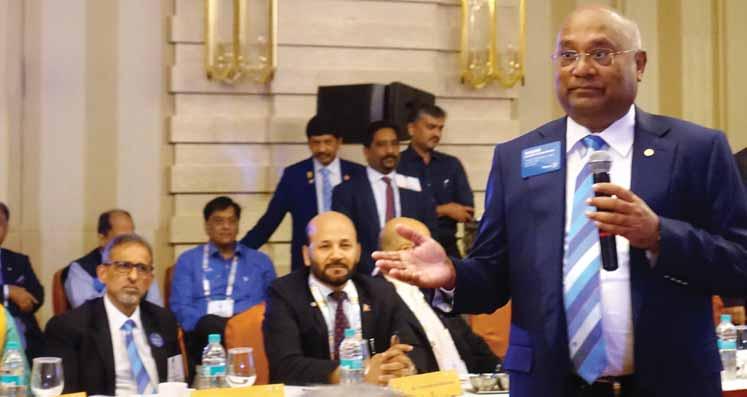
RID C Basker addressing the ‘Let’s rebuild Kerala’ session. From L: DGs S Piraiyon, Suresh Hari,
Bhattarai; Back row: PDGs Ramesh Aggarwal, Vinod Bansal, Vijay Jalan, Avinash Potdar, E K Sagadhevan, Suresh Mathew and Dr Rajesh Subash are also in the picture.
headed by PRIP Banerjee and including RID Basker, TRF Trustee Gulam Vahanvaty and the governors of the three districts — E K Luke (D 3211), A V Pathy (D 3201) and E K Ummer (D 3202) — formed and registered the ‘Rotary Kerala Disaster Relief Trust’ in Kochi. All relief funds received by the districts have been pooled into the Trust. Rotary districts and clubs from across the country and the globe have been sending their contributions to the three governors since the disaster. The DGs thanked the Rotarians and senior leadership for extending support to Kerala.

RI President Barry Rassin, appreciating the alacrity of Indian Rotarians in extending help to the State, recommended the creation of a Donor Advised Fund (DAF) with TRF. Citing his experience from the relief work carried out after the Haiti earthquake in 2010, he said, “A DAF is more familiar and acceptable for people outside your country and it will be easy to raise funds through that than through an indigenous Trust. Sixty countries contributed to the DAF created for the Haiti disaster. This can be done for India too, for people across the world have faith in the Foundation.”
Basker immediately offered a personal contribution of $10,000 for setting up a DAF for the Kerala disaster.
Earlier, addressing a session on Let’s rebuild Kerala, PRIP Rajendra K Saboo urged Rotarians to approach corporates for funds to support the cause.
“Those of you heading your own enterprises may consider routing your CSR funds to rebuild the State,” he said. His own employees had donated a day’s salary, which his company matched, and the amount was given for relief and rehabilitation.
“My younger son in the US too gave $25,000 from his DAF,” he said, while
recalling the rehabilitation activities after the Bhuj earthquake in Jan 2001, and the subsequent construction of 1,000 houses, thus forming a ‘Rotary village’.
“This is an opportunity for all districts to come together and execute one huge project that will also enhance Rotary’s visibility among the community,” said Basker, as he called for all the governors to donate generously from their DDFs. He appreciated D 3000 Governor R V N Kannan for donating $47,000 from his DDF for constructing low-cost shelters in Kerala through a global grant.

RI Director Eunsoo Moon from Korea announced his district’s financial support for this endeavour.
Pathy elaborated on the modalities saying that the estimated cost of a 339 sq ft, single BHK unit is `350,000 and invited individual Rotarians to sponsor a house. “Such a house will be named after a person of your choice and you will be recognised by RI with a certificate, besides having the honour of handing over the key to the beneficiary.” One option is to get global
grant for 240 houses in the three districts; the second to tap CSR funds for 1,000 houses; and the third direct contribution from Rotary districts and clubs to build the remaining 1,760 houses.
Making a presentation at the session, Dr Rajesh Subash of RC Calicut Midtown said that the Chairman of the Aster Healthcare company Dr Azad Moopen is looking for a Rotary partnership to construct 250 homes in Ernakulam, Alleppey and Wayanad as their CSR initiative. “The plan outlay is $250,000 and this can be scaled up to $1 million
We will all work together and rebuild Kerala and Coorg as fast as possible. We will make this an outstanding project to serve the community.
TRF Trustee Gulam Vahanvaty
if Rotary comes out with a good proposal. We want to construct the houses before the next monsoon.”
Basker said a brochure will be distributed to corporates to get funds for such houses for the flood victims.
Lauding the efforts of the three governors, whom he referred to as ‘Amar, Akbar, Antony’, TRF Trustee Gulam Vahanvaty said, “We will all work together and rebuild Kerala and Coorg as fast as possible. The global grants team at the Foundation is gearing up to expedite sanctions and I will also personally see what needs to be done. We will make this an outstanding project to serve the community and make The Rotary Foundation and Rotary shine bright.”
A commitment sought by Basker as a contribution from the DGs’ DDFs yielded $500,000, plus
`1.2 crore. Almost all the districts agreed to sponsor a few homes. While PRIP Saboo announced a personal contribution of `20 lakh; RRFC Vijay Jalan and D 3011 DG Vinay Bhatia agreed to sponsor a house each and EMGA Vinod Bansal agreed to sponsor 50 houses from his CSR funds.
TRF Trustee Mike Webb pointed out that the consolidated DDF of $3 million from the three zones carried forward over the years, plus the $4.5 million DDF allocated for this Rotary year is available for construction of houses in Kerala. “I ask each of the governors here to really look at your DDF. It is not meant to stay in some bank account. It is meant to help people in need. You can seek a global grant with such a treasure that you have,” he gently prodded.
Pictures by Rasheeda Bhagat
Amiracle of sorts happened when thousands of acres of crop were destroyed by the recent devastating flood in Kerala, but the paddy cultivation done by Rotarians under REAP, District 3211’s iconic organic rice growing project, escaped nature’s mayhem. The project, which is an acronym for Rotary Empowerment of Agricultural Production, was launched last year under the leadership of the then DG Suresh Mathew to revive the dwindling practice of agriculture in a State where farmers had moved on to greener pastures, leaving thousands of acres of land fallow.
As Rotary clubs came forward to organically grow the local variety of Kerala rice and women started demanding more of it, the project succeeded in greening a good portion of the fallow land. Having featured the story on the cover of Rotary News in the March
issue, I wondered what had happened to the REAP cultivation. A beaming PDG Mathew I met at the Chennai Institute responded: “A few months before the torrential rain shocked Kerala, the golden harvest of REAP had already been taken by our Rotarians. Fortunately, the new chairman of REAP for 2018–19, Rtn Meenakumaran Nair, a former AG, had foreseen the flood and delayed the seed sowing ceremony.”
He was happy to share that it was the foresight of Nair, “a passionate farmer himself, that saved REAP from the clutches of this catastrophe.”
Last year REAP was launched as a pilot, but seeing its success, Nair has convinced a big cluster of clubs to take up a much larger area for cultivation this year. “The first 50-acre cultivation will be done at Pallipuram Padasekharam, located at the technology hub of Kerala in the suburbs of Thiruvananthapuram. Also, he plans to bring in young techies
from tech companies in and around the nearby Trivandrum Technopark campus, thus getting the next generation interested in farming.”
Mathew added that in the aftermath of this massive natural calamity, “people in Kerala are now realising the need to protect mother nature. Rotarians strongly believe that REAP has more relevance in the wake of this disaster in Kerala.”
He added that just before the disaster, 10 acres of land cultivated by RC Quilon Heritage had already been harvested. “The club recently organised a post-harvest Cattle Race Festival that was a huge success with many villages participating.” While in the last week of October, RC Alleppey North sowed the seeds in another 10 acres of paddy at Alleppey, “cultivation at the 50-acre paddy land at Kazhakuttom, Thiruvananthapuram, will be jointly done by a cluster of clubs in the first week of November,” he said.

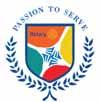
Rasheeda Bhagat
New initiatives undertaken by Zones 4, 5 and 6A, during the last 15 months of his tenure as Director, including comprehensive training programmes, stricter norms on holding them, a quantum jump in the reporting of Rotaractors in our zones and new publications brought out by the Rotary News Trust, were highlighted in his inaugural address at the Chennai Zone Institute by RI Director C Basker.
At the outset he thanked “each and every one of the 151,853 Rotarians in our zones” from 3,929 Rotary clubs in the 40 districts of Zones 4, 5, 6A for ensuring that our zones not only contribute to membership growth of RI but once again we were positioned as second in the world last year by contributing over $19 million to TRF.”
With the support of his DGs and other senior
Rotary leaders in India, as Director, he had focused on many initiatives, with the main aim being to “strengthen our Rotary clubs so that they can address the local community concerns and build a good public image for Rotary.”
Basker said he had placed great importance on training programmes of club presidents, secretaries and other officers which had now been structured on the RI handbooks translated into regional languages and distributed. Disha, a national-level training programme for District Chairs in membership, Public Image and Foundation had been started. DGs had been given templates to conduct district-level seminars to give Rotarians clarity on all the focus areas of Rotary and its priorities.
“I’ve also got the RI Board to recommend that

district training meetings be held within the district boundaries to conserve participants’ cost and time. Getting more women into Rotary had been prioritised and we are seeing great service projects happening in our zones through allwomen Rotary clubs.”
To encourage clubs to do better and larger service projects e had initiated the ‘Best club project video’
to ensure that Rotary clubs shared their good work done in the community with the rest of the Rotary world. “This will help us showcase our work on the number of man-hours and money spent on service projects for the benefit of the community,” he added.
The RI Director said that during his tenure he had
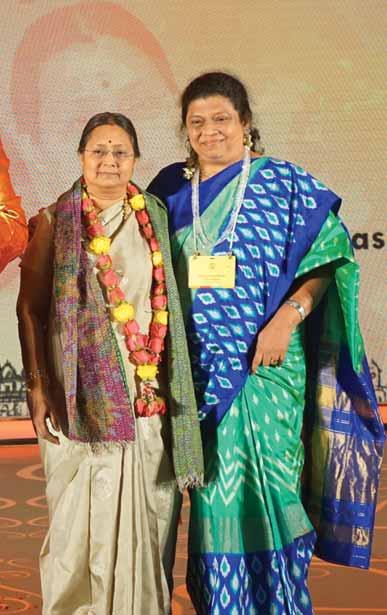
focused on Rotaractors and the organisation of two successive DG and DRR coordination meetings at Hyderabad and Delhi had resulted in “massive improvement in member reporting by Rotaract clubs to RI.” The reporting rate had risen by a staggering 63 per cent — from 9 to 72 per cent, and “we expect to capture nothing short of 100 per cent membership data of Rotaract this year.”
Such dramatic improvement had been made possible by giving incentives; “Rotary Coordinators have offered to take the best performing DRR of 2018–19 of the zones to the RI Convention in Hamburg at their own cost. I am sure this will encourage all DRRs to work tirelessly to achieve their set goals.”
Rotary News Trust initiatives:
Rotaract News, a digital quarterly magazine brought out by Rotary News Trust, had increased awareness among Rotaractors on the activities happening across our zones and enthused them to share the projects they were doing. In the last year, RNT had also launched a monthly e-magazine titled Rotary News Plus, that features good service projects done by Rotary clubs. “Now no Rotary club complains about not finding their service projects in the magazine!” RNT was also working on bringing out
We are seeing great service projects happening in our zones through all-women Rotary clubs.
RI Director C Basker
the magazine in regional languages, he said.
“We are now sending print copies of Rotary News to leading corporates in India so they can understand how Rotary can be a great partner for their CSR activities.” By streamlining the activities of RNT, particularly printing, “we have been able to save `4 million in its operational cost, and this money will be used for other productive purposes,” Basker added.
Thrust on accountability, transparency Reading out the riot act to those who indulged in “financial malpractices”, he said DGs had been asked to monitor and report activities of clubs that misused the ‘Rotary’ name by forming trusts that functioned “without transparency and accountability”.
Based on a request from this zone last year TRF trustees have approved the formation of an oversight panel comprising experienced PDGs to oversee all the completed global grants in India and ensure the project
Past RI President Rajendra K Saboo was conferred the PolioPlus Pioneer Award, which was originally established in 1996 to recognise Rotarians who had rendered “outstanding personal service to PolioPlus prior to November 1992”. The award was discontinued in June 1999, but has now been reinstated by TRF Trustees as the goal of a polio-free world draws near, to recognise those Rotarians who deserved it but did not receive it between 1996–1999.
The citation said: “A number of Rotarians have contributed significantly to the tremendous progress so far achieved in the global effort to eradicate polio. The tireless efforts of these Rotarians on behalf of the PolioPlus Programme are worthy of great praise and recognition.”
Accepting the award, a deeply moved PRIP Saboo said in a choked voice that he “was extremely and truly humbled to get this honour. Part
of this journey started in 1981 when I was on the Board of Directors when RI undertook the task to immunise the children of the world. And Polio 2005 was born. Since then, the journey has been continuing and we’re almost there.”
Fighting back tears, he hoped that “by God’s grace” he would be there when every Rotarian’s dream of a totally Polio-free world was realised. “Till then Usha and I hope to continue to serve Rotary and our community...”
Unable to proceed further, as he handed back the mike, PRIP K R Ravindran thrust it in Usha Saboo’s hand, urging her to say a few words. Her response: “This is an imposition… when the man who worked for it (award) doesn’t have the words, how do you expect me to find the words to express anything? Let me just say that whatever Raja has been able to do, it has been with god’s grace and he was not alone in this
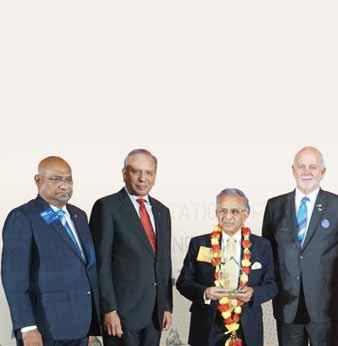
Raja was not alone in this work. He was assisted by all of you and many more who are not present here today. Actually, all of you deserve this award.
Usha Saboo
work. He was assisted by all of you and many more who are not present here today. Actually, all of you deserve this award!”
Welcoming the gathering, Chairman of the Institute PDG ISAK Nazar and EMGA Sam Patibandla said the Institute Committee had worked very hard to bring together over 800 delegates from 10 different countries to Chennai and make the Institute with the theme Passion to Serve a really memorable and meaningful one.


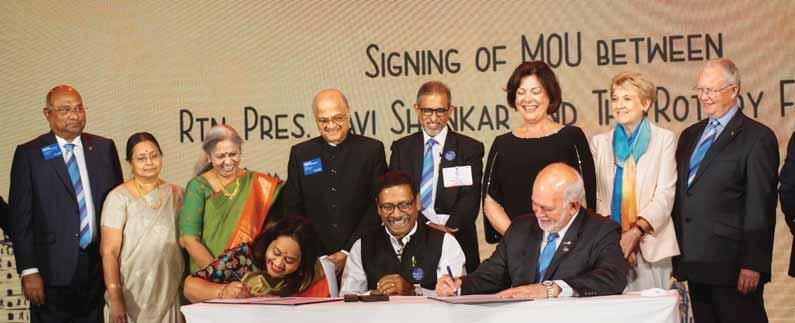
RI President Barry Rassin signs an MoU with RC Bangalore Orchards President Ravi Shankar and spouse Paola in the presence of (from L) RID C Basker, Mala, Anita Hari, TRF Trustee Gulam Vahanvaty, D 3190 DG Suresh Hari, Esther Rassin, Alison Webb and TRF Trustee Mike Webb.
was completed as spelt out in the grant application. “This is a sort of in-house audit to ensure every single dollar received is rightly spent by the clubs and districts.”
He was happy to announce that “District 3100 has been rehabilitated by the RI Board and is functioning as a regular district from this year.”
Basker said RI realigns zones worldwide every eight years based on membership. “Can we think on similar lines in India and realign district boundaries in terms of membership, geographic contiguity, language and State considerations, ease of travel for DGs, etc, without increasing the number of districts?” Some DGs had to travel excessively because of their district size and this affected their efficient functioning. He urged RI officers to give suggestions on how this could be done.
Rtn Ravi Shankar, you have made Rotary proud. Your inspiration keeps us more energised and wanting to give back more to the community.
RI Director C Basker
The recent natural disaster in Kerala and some parts of Karnataka due to unprecedented floods had caused untold misery and loss of homes. He was happy that the Rotarians of Kerala and the rest of India had risen to the occasion and responded with alacrity during this humanitarian crisis. Now it was time to focus on the rehabilitation work to help those who had become homeless. PRIP Kalyan Banerjee had agreed to head
the panel formed for the project of building low-cost shelters. He appealed to Rotarians to donate liberally for this cause; each such house would cost `3.5 lakh, and anybody donating this amount could have the new house named after a person of their choice.
Basker said at the dawn of the new Rotary year an exciting development had stunned the entire Rotary world. “In a major philanthropic gesture, the Bengaluru-based President of RC Bangalore Orchards, District 3190, D Ravi Shankar and his wife Paola had donated a whopping amount of `100 crore ($14.7 million) to The Rotary Foundation.” Thanking the couple who were honoured at the Institute and who signed an MoU with TRF on how the money should be spent, the Director said, “You
are a true inspiration for all of us and have made Rotary proud. You have made India proud. Your inspiration keeps us more energised and wanting to give back more to the community.”
By following the footsteps of his philanthropic father Kamlesh, who had donated all his land in Vinoba Bhave’s Bhoodaan movement, Ravi Shankar had donated this money to share his wealth with the needy people through Rotary, and become the second single largest donor after the Gates Foundation. He congratulated DG Suresh Hari for motivating Ravi Shankar to give this gift.
“Please use this unique platform to share your ideas, take action and keep the Rotary wheel moving,” added EMGA Sam Patibandla.
Pictures by K Vishwanathan

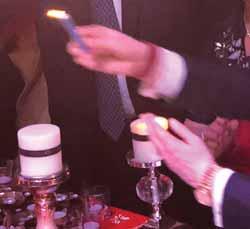


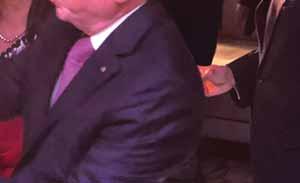
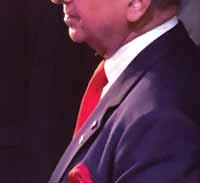





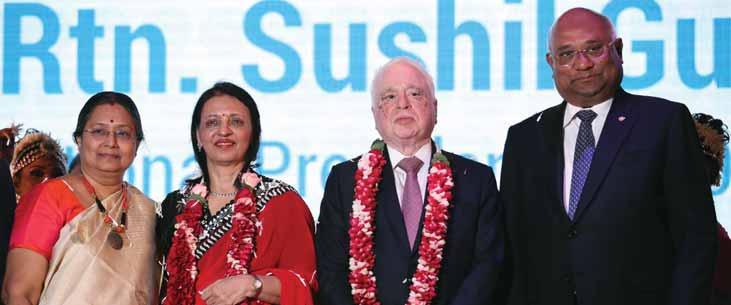
Right: (From L) RIDE Bharat Pandya, PRIP Kalyan Banerjee, TRF Trustee Gulam Vahanvaty and RIDE Kamal Sanghvi.
Below: (Clockwise) DG
Subhash Jain, Punita Bhatia, PRID P T Prabhakar, Sharmishtha Desai, PRID Manoj Desai, RIDEs Kamal Sanghvi and Bharat Pandya, PRIP Rajendra Saboo and Vinita Gupta.
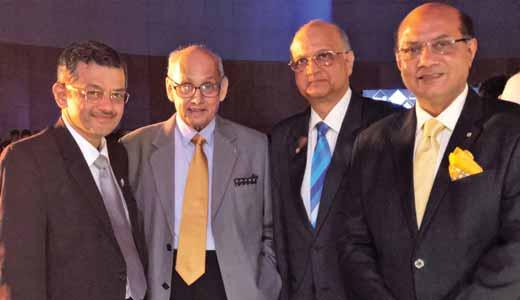
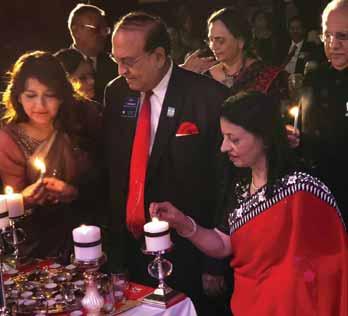



Kalyan Banerjee
Congratulating Sushil Gupta for his nomination as RI President for 2020–21, Past RI President Kalyan Banerjee said at the Delhi event, “Today is certainly one of the happiest days of my Rotary life as we gather here to celebrate the rise to the top of one of my best friends — a friend yes, but one who has been more of a younger brother to me over the years as we started our work on polio eradication in India together, back
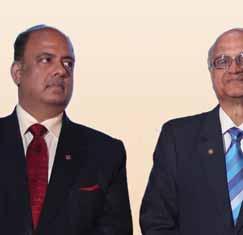
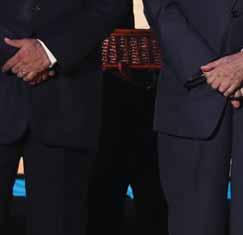
in the 1980s, and have gone through our Rotary lives, sharing TRF Trusteeship also together.”
He disclosed that Gupta’s close friends in Rotary had “encouraged him to conquer Rotary’s Everest too, and he bided his time till the opportune moment came.”
Banerjee said the Nomination Committee for the President in Rotary is a unique committee. It has elected representatives, all past directors, from
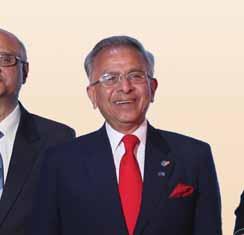

17 of the 34 zones worldwide always, and “they are all seasoned, experienced Rotarians. And Gupta had a competitive field from both the Americas, North and South, and Europe as well.”
In a speech that was both passionate, entertaining and packed with punches, Banerjee said he had spent a “sleepless night on the day the Nominating Committee met in Evanston, Qatl ki Raat (night of reckoning) — as we called it. Sushil and I talked after
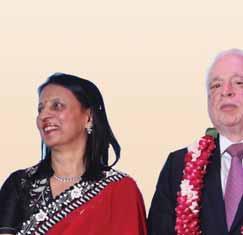



He may be a man of few words, but his work, especially in water resources, is unmatched in Rotary. He is one of the originators of the Rotary Action Groups and has been taking up India’s cases and causes again and again as TRF Trustee.
PRIP Kalyan Banerjee



his first interview with the committee and he said he had done ok ok. He didn’t rave about the interview.”
That was at 2 am IST; as the Nominating Committee interviewed others, we talked again at 3 am and 4 am. He was waiting to hear the final choice. At 4.45 am, we talked again — he said: Pata nahin kya ho raha hain (I don’t know what is happening) and then suddenly, he said, ‘Kalyan, wait a minute. Something is happening.’ My phone went dead for half a minute, till suddenly Shekhar Mehta, a member on the Nominating Committee, with our own Manoj Desai, came on the line and burst out saying Gupta had been nominated.”
When Gupta came on the line, and said: “Well Kalyan, we seem to have done it. And I said let me be the first person outside Evanston to congratulate you. I know it was a tough field with two ladies, each wanting to be the first woman RI President, one of them very popular, and a strong field from Europe too.”
A beaming Banerjee added that he then woke up his wife Binota to give her the good news. She too had spent an almost sleepless night, “but then who cares when your brother is chosen as RI President? She and I celebrated with an early cup of tea.”
He was certain that the fourth RI President from India would be a fine leader. “He may be a man of few words, but his work, especially in water resources, has been unmatched in Rotary. He is one of the originators of the Rotary Action Groups and has been taking up India’s cases and causes again and again as TRF Trustee. And as a host, his and Vinita’s hospitality is unparalleled as is his ever booming laughter.”
Banerjee disclosed that though he himself had authored the proposal for TRF to give global grants for CSR in India, a unique facility for India at present, Gupta was “the architect; without him, it would not have happened”.
Wishing Gupta and Vinita a great innings in 2020–21, he added, “Vinita is a very special human being and she will add so much to Sushil’s presidency as the first lady of Rotary.” He urged Gupta: “Itni shiddat se apna farz nibhao ki purdah girney ke baad bhi taliyan bajti rahen (Carry out your responsibilities with such intensity and solid hard work that the applause continues after the curtain comes down).”
Congratulating Gupta for his nomination to RI’s top post, PRIP Rajendra Saboo recalled the day Banerjee had got nominated. “It was my 75th birthday and when he called me, I was awake. I did not keep awake even the night I got nominated. When Kalyan (Banerjee) called and confirmed it, I said this is the best gift for my 75th birthday.”
Just as athlete Hima Das had tears rolling down her face as she got the gold for 400 m (in the world junior athletics in July, 2018) when she saw the Indian tricolour going up at the award ceremony, so would every Indian’s heart swell with pride when they see our tiranga go up at the One Rotary Centre on July 1, 2020, he said.
Saboo disclosed that while all three RI Presidents from India hitherto had been born in Kolkata, Gupta too had a Bengal connection! “Vinita’s parents spent a substantial part in Bengal and absorbed so much of its culture that they had named Vinita as Binota!”
Having known Gupta for a long time he could vouch that a “person of his temperament and deep spirituality, one who has come up from the grassroots and is so committed to serve, will be the best man to take our organisation forward”.
Saboo disclosed that after Gupta’s address at Chennai, “which Usha found an outstanding speech”, where he had expressed thanks to PRIDs Manoharlal Manchanda and Sudarshan Agarwal, some people had wondered how
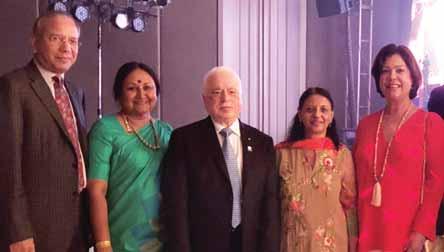
“I felt about Sushil praising ‘Manchanda who was against you’. And I said: ‘So what? If you are my friend, forget about it. It is the past.’”
He recalled how a few years ago when he had suggested to Gupta that “we should forget the past, he stood up, embraced me and said: ‘Raja what you have said has been in my mind for all these years.’ That time we decided that we can’t erase history but we can certainly forget it. I realised then that this man has the strength of character and can truly be our leader.”
Saboo added that while he gave full marks to Gupta for “the way he took up the polio eradication task right from 1986–87, and the way he has worked in water conservation and Swachh Bharat through WinS, “I urge
I urge you not to bask in all the praise that is being showered on you. The person sitting next to you, Vinita, is your biggest strength.
PRIP Rajendra K Saboo
you not to bask in all the praise that is being showered on you. The person sitting next to you (Vinita) is your biggest strength. If we are bonding like this today it is Vinita who has really connected us. Vinita, the kind of love and affection you have showered on Usha and me, we can never forget.”
PRIP K R Ravindran said in a video message that Gupta’s nomination as RI President in 2020–21 was particularly important to him “as coincidentally I will be serving that year as the Chair of TRF and naturally I’d like to work with a president with whom I can establish a cordial working relationship, which is fundamental to the wellbeing of our organisation.”
Terming Gupta’s nomination as a “very good choice” he said having worked with him for two years on the TRF Board of Trustees, “Ï can vouch that his contribution as the chairman of the Finance Committee and a member of the Investment Committee was impressive, to say the least.”
Having walked the path himself, he said being RI President is a very demanding task. For more than two years “you will have to be away from home because the period of preparation
Because of his hands-on experience in doing hundreds of projects, Gupta is in a better position as he knows the ground realities and the kind of problems communities face.
PRIP K R Ravindran
is as strenuous as the presidency itself. For two years, during my presidency and the previous year, I stayed only 11 days at home. Your body is subjected to extremes of jet lag, because it is a leadership role on a global scale, and you have to keep in touch with the RI staff and the Foundation.”
But the huge advantage leaders from this part of the world have is that “most of us have had the opportunity to provide leadership in projects at the grassroots level. Sushil (Gupta), an expert in water conservation, has done hands on work in hundreds of projects,” And most admirably, he had executed these projects with 100 per cent focus on the local community. “Therein my friends, lies the lesson for every aspiring leader, because of his hands-on experience, Gupta is in a better position as he knows the ground realities and the kind of problems communities face.”
Another advantage was his commercial background and experience as a senior CEO of a large corporate entity with several best practices. Having worked with international organisations, he had the ability to integrate with different cultures, and look for new opportunities, Ravindran added.
Pictures
by Rasheeda Bhagat

very year we celebrate November as Rotary Foundation Month.
How fortunate we are to have a world-class Foundation that allows us to do so much good in the world. We should all take pride in the fact that something good happens every second of every day because of Rotarians and our Rotary Foundation.
Remember how excited we were at the 2017 Rotary International Convention in Atlanta, where we celebrated the Foundation’s first 100 years? The fundraising goal for that year was $300 million, and, as you recall, we raised $304 million to exceed that goal. It was a landmark year for the Foundation.
In the 2017–18 Rotary year, as the Foundation entered its second century of service, we had an even more ambitious fundraising goal of $360 million. At the convention in Toronto in June, outgoing Trustee Chair Paul A Netzel told attendees that we once again had a landmark year for our Foundation, setting a one-year fundraising record of $373 million.
This year our fundraising goal totals $380 million. Our goal for polio is $50 million, which will be turned into $150 million through the Bill & Melinda Gates Foundation matching grant. Add to that a $137 million goal for the Annual Fund, $61.5 million for the Endowment Fund, and $31.5 million for global grant cash and other outright gifts, and our many programmes will be fully funded and Rotarians will be completely equipped and empowered to continue making real change.
Now, it’s up to you and me. We have the chance to forge a path of ever-increasing relevance and influence — to choose the direction and tempo of the Foundation’s second century.
I’m challenging you to increase your involvement in our Foundation — by doing, by giving, and by inspiring. Together we can make tomorrow even brighter than today. We can make every month Rotary Foundation Month. So, Be the Inspiration, build your Rotary legacy, and let’s make this yet another landmark year in our history.
Ron D Burton Foundation Trustee Chair
Gundula Miethke
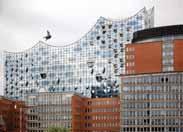
Hamburg’s architectural face has changed dramatically over the centuries — because of a major fire in 1842 and extensive damage from bombing during World War II, because of economic growth, and because its citizens have always embraced change. You will find postmodern glass and steel facades, classical 19th century mansions, and a few half- timbered gems dating to the 17th century.
Two things are typical of Hamburg architecture: maritime motifs and red brick. A must-visit is the Speicherstadt, a dockland warehouse complex built between 1883 and the end of the 1920s that now houses restaurants and museums. Its brick buildings are part of a UNESCO World Heritage site, together with the nearby Chilehaus, built in 1924, whose dramatically pointed east corner evokes a ship’s prow.
The Elbphilharmonie concert hall takes the nautical idea in a different direction. The bold glass construction, whose roofline resembles waves, sits atop a repurposed brick warehouse. The City Nord district features office buildings in a parklike setting, an idea popular in the 1950s and ’60s. Walking along the wide streets feels like visiting an open-air architectural museum. For an in-depth experience of Hamburg’s architecture, guided tours are offered by a number of companies, including A-tour (a-tour.de/en).
Register for the 2019 Rotary Convention in Hamburg at www.riconvention.org.

One year is all you have, go forth and work with passion. You have such powerful leadership in your zones. You have Kalyan Banerjee, Raja Saboo and K R Ravindran, and the directors, past, present and future. What Basker has done in membership is truly impressive. You are No 1 in the world for membership growth. Inspire your members in such a way that this organisation will be proud of you.”
With these words RI President Barry Rassin presented the graduation certificates to the 40 DGEs of Zones 4, 5 and 6A at the end of a three-day GETS held prior to the Rotary Zone Institute in
Chennai during the first week of October. He was the chief guest at the Institute and he enthused the governors-elect with references drawn from the book The Radical LEAP authored by Steve Farber. Elaborating on the elements of LEAP — cultivate Love; generate Energy; inspire Audacity and provide Proof, Rassin called upon the incoming leaders to “do what you love in the service of people. Without love, you will have no reason to go the extra mile.” Leaders must find the energy to work through obstacles and energise people around them. “You must have audacious goals. Mine is to double the number of Rotaractors. Inspire your club presidents to start a Rotaract club.
Ultimately show proof of progress. At the end of the day, productivity and profitability tell the whole story,” he said. The LEAP framework will “help you get the best out of yourself and others.”
Earlier, Institute Convener and RI Director C Basker set the tone of the workshop saying, “With great power comes greater responsibility, and the RI board goes by your recommendations. Develop a maturity to carry everyone along with you, including the presidents who did not vote for you. Everybody is your friend in your challenging journey.”
The Institute was held two months in advance this year, Basker said, so

DGEs with RIDE Bharat Pandya, Madhavi Pandya, Esther, RI President Barry Rassin, RID C Basker, Mala, RIDE Kamal Sanghvi and Sonal Sanghvi, after the graduation ceremony.
that it would give more time for the DGEs to plan and select their teams. “You will be better informed when you go for the International Assembly in Jan 2019.”
Laying great stress on building an ‘effective’ team, he said, “Choose your team not based on friendship, or to return a favour; it should be on merit. Remember that your success depends on the people you choose to be in your team. They must be effective and conversant to assist you and take your district to great heights.”
He reiterated to the incoming DGs that the District Training Assembly (DTA) is exclusively for the club officers and has to be for a minimum nine hours. “I have been stressing on this all through my tenure but I still find districts conducting it as speaker meetings.” All training programmes are to be held within the district, he said. “When you conduct
such programmes abroad, many club officials cannot afford the travel cost and hence miss the training. The PETS, SETS, DTA, AGTS and DISHA are all training events and are meant to make your districts exemplary. They are not fun activities,” said the Director.
Hold review meetings periodically; use the GML to highlight the work done by clubs and not as a platform to exhibit photos of the governors, were few other important points he highlighted.
A leader should be like a billiards player, said RIDE and GETS Chair Bharat Pandya. Just like how he goes around the table, polishes the cue and focuses on the right angle before pocketing the ball with the right force, “training sessions show you the right focus and direction to enable you to pocket your district’s success.”
Referring to a quote of writer Carlos Castenada, Pandya said: “All of us have a cubic centimetre of chance that pops out in front of our eyes from time to time. You are all warriors and this programme is designed to sharpen your leadership skills and train you to be alert enough to pick up your cubic centimetre of chance.”
Earlier, Institute Chair ISAK Nazar, remarking on the uniqueness of the training modules, said that “GETS gives you an opportunity to learn. But you have to imbibe the lessons and be ready to transform.”
RIDE Kamal Sanghvi inspired the incoming leaders citing a pencil parable. “Like a pencil, you can do many great things, but only if you allow yourself to be held in someone else’s hand. Sharpening is painful, but it is critical to bring out the lead
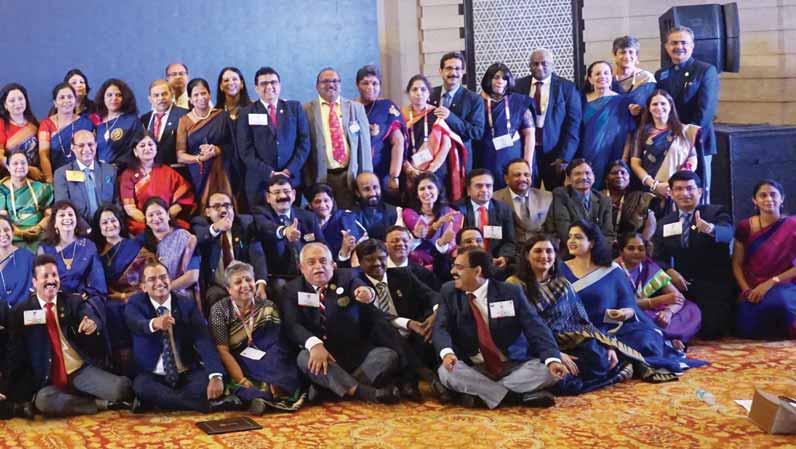
inside. The eraser helps you to correct most mistakes you make. When you fail and are like a broken pencil, be thankful for the opportunity, for, a broken pencil has two sides with which you can write. Rise like a phoenix and learn from your failures. Rough or smooth, whatever surface you are used on, make sure you leave a mark,” he said.
Sanghvi awed his audience with a bottle experiment he demonstrated to drive home the message not to be shaken by external forces. “When people try to shake you, don’t fizz up like a Coke bottle; instead stay calm like a water bottle,” he said.
TRF Trustee Mike Webb drew the DGEs’ attention to the huge amount of DDF lying unused in the districts’ accounts. A total of $7.5 million — an unspent rollover of $3 million accumulated over the years, plus $4.5 million of earned DDF — is available for the DGEs of the three zones under DDF. “Please use the DDF allotted by TRF for your districts to do good. It is not meant to stagnate in some bank

account,” was a forceful message he repeated in all his sessions. “It is not a matter of pride to say that you ended your year with more DDF balance than what you found at the beginning.” The rollover money can also be used for global grants, he added.
Webb also pointed out that “30 per cent of the clubs in the three zones have not contributed to TRF. I challenge each governor to ensure that
all clubs contribute to the Foundation. Even $100 a club is better than zero contribution.”
RI Director Eun-soo Moon from Korea inspired the incoming leaders on enhancing membership and retention. He gave tips on attracting young members and Peace Fellow alumni to Rotary. Talking about Exceeding expectations, PRIP Rajendra K Saboo recalled a comment made by a Rotarian when he was serving as RI President. “When he told me ‘Mr President you are not the president of RI, you are the president of the people’ that was the best ever compliment I received,” he said. Listing out eight ingredients for effective leadership, he urged the future governors to think big and act big, shed ego and perform with integrity.
Facilitated discussions in strategic planning, membership growth, Foundation giving, district grants and building public image further strengthened the workshop.
Pictures by K Viswanathan
Medicaltreatment for the economically weak got a major fillip at the KEM Hospital with RC Mumbai Malabar Hill, D 3141, implementing a global grant project that involved the upgrading of its Gastroenterology department at a cost of `1 crore.
The upgrades include setting up modular Endoscopy theatres along with a recovery room and installing two critical devices — Multipara Monitor and a Breath Analyser. While the multipara monitor keeps a close watch on the patient’s vital parameters, the breath analyser helps to measure the hydrogen and methane in the respiratory system.
“With this equipment, accurate diagnosis is possible to

target therapy and provide dietary advice to patients,” said Nilesh Barfiwala, past president of the club. On an average 6,500 patients visit KEM Hospital in a day, and the Gastroenterology department gets 20,000 patients a year.
The club joined hands with RC Saskatoon, D 5550, Canada, to implement the project. In the past, it has taken up community projects like the revamping of the Banganga crematorium and support to the St Judes India Child Care Centre. The then DG Prafull Sharma along with KEM Hospital Director Avinash Supe inaugurated the new facilities in the presence of Rotarians and doctors.
You can pay the Rotary News / Rotary Samachar subscription online
Our Bank details:
Bank : HDFC Bank SB Account
Branch : Egmore, Chennai
A/c Name : Rotary News Trust
A/c No. : 50100213133460
IFSC Code : HDFC0003820
E mail us following details:
Name of Club
President/Secretary’s name
Amount/Date of transfer/UTR Number
For physical payment by cheque or cash in bank, write Club Name only without prefixing “Rotary club of”. Eg. Rotary Club of Delhi Central should be written: Delhi Central.
RI Exchange Rate - November 2018 $1 = ` 73




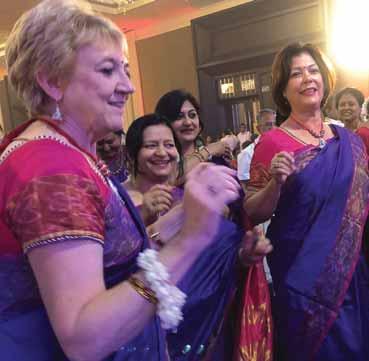
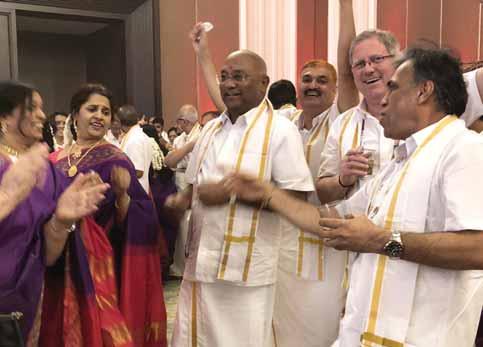
Clockwise: RID C Basker shaking a leg with PDGs Deepak Pophale, David Hilton and Subhash Kulkarni.
RID C Basker and Mala with their sons Gautham (left), Gokul and daughter-in-law Divya.
From L: DG Ashes Ganguly, Rtn Abhay Geed, PDG Atul Gargava, RIDE Bharat Pandya, PDGs T N Subramanian and Bansidhar S Dhurandhar.
Alison Webb and Esther Rassin jive to music with Rotarian spouses.
PRIP Rajendra Saboo displays some Bhangra moves as Esther Rassin looks on.
From L: RID C Basker, RI President Barry Rassin, Esther, Mala Basker and PDG Natarajan Nagoji.
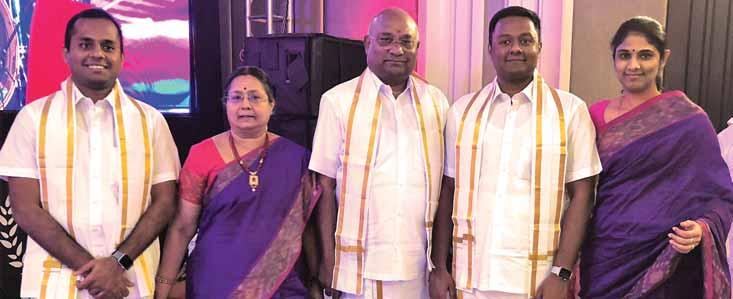

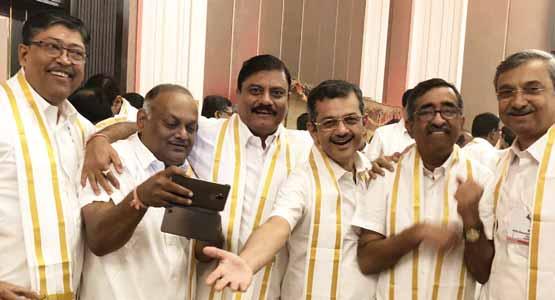




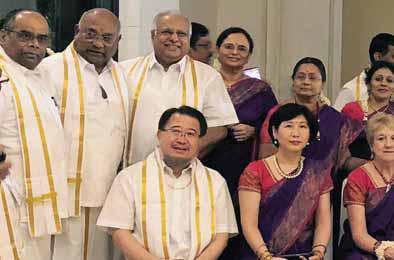



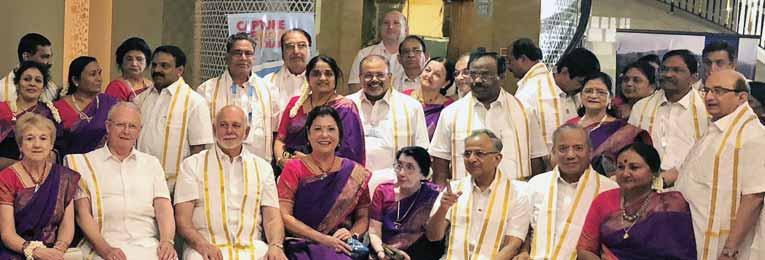
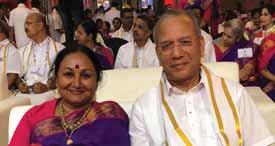




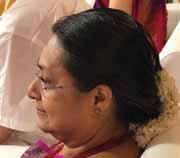

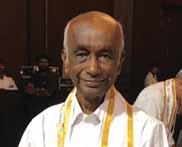

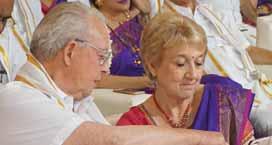


Rasheeda Bhagat

Amost generous donation — of `100 crore to TRF from a single Rotarian — D Ravi Shankar from Bengaluru — had shown that Rotary in India is ready to take a quantum leap in “our commitment to the world for creating everlasting peace while serving humanity,” Rotary International President Nominee Sushil Gupta said, as he went down memory lane at both the felicitation events held at the Chennai Zone Institute and his home districts 3011
and 3012 (erstwhile 3010) to relate how Rotary had transformed his life.
His father was very fond of the Himalayas and would take Gupta as a child for holidays usually to Nainital or Mussoorie and “at one of the places I’d see a board which said ‘Rotary meets here’.” Though he didn’t know what Rotary was, it aroused a curiosity and a desire that “when I get older, I must join Rotary. It left a photographic impression on my mind.”
In 1977 this dream came true and he joined RC Delhi Midwest and became President of the club in 1981.
In between he had ventured into the hospitality business and undertook the arduous task of constructing “a hotel in Delhi, not an easy task. I encountered hurdles at every step and then I saw the magic of Rotary unfold! Also, I was lucky enough to enjoy the patronage of senior leaders in my district, including PRIDs Manoharlal Manchanda and
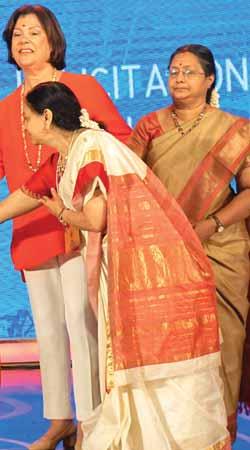
Sudarshan Agarwal, who always held my hand to overcome all the obstacles in my new venture.
“In India, all of us know, nothing happens by itself. At every step there is a hurdle and you need somebody who can use some influence or power and that’s how I was able to construct my hotel in a record time of 30 months. That’s how the Hyatt Regency in Delhi opened!”
Gupta added he also got a lot of help from his club members… I always saw the magic of Rotary
Water conservation has become my passion. I’ve seen how the availability of water changes the life of people.
and how you stand to benefit through Rotary.”
A new chapter begins
In 1985 he was elected DG of D 301 comprising Delhi and the NCR, and thus started a new chapter which exposed him to both the Indian and global Rotary.
Gupta admitted that till 1988, when he was asked to take the role of vice chair in the Rotary Polio Eradication Task Force, “my Rotary journey was more of fellowship and friendship, but this responsibility changed my outlook and I realised that Rotary was not only fellowship but more so service to mankind”.
As he got busy in the task of educating and mobilising Rotarians in polio eradication, gradually service projects came on his plate… water projects, heart surgeries and so on.
But before becoming a Director of RI, “in the ’90s, I became associated with the Himalayan Environmental Trust and that brought a totally different perspective of how precious the environment, specially water, is to
mankind. And I became an environmentalist and water activist!”
And this interest, while he served as a TRF Trustee, fetched him the role of global chair for WinS. “Water conservation has become my passion. I’ve seen how the availability of water changes the life of people.”
The journey continued; last year he completed his term as TRF Trustee and “now I have been given the responsibility of this august office — to lead RI in 2020–21. This is a great recognition of Rotary in India and our zones. I am the fourth RI President after Nitish Laharry in 1963–64, Raja (Saboo) in 1991–92 and Kalyan (Banerjee) in 2011–12, and now this Punjabi puttar from Amritsar has got this opportunity.”
“As I look back,” he added, “Rotary has come a long way and has changed a lot over the years, and more so in the Foundation. Our service projects… hospitals and health projects, the literacy and WinS programmes, and our getting rid of polio from the country, all denote the great work all of you have been doing.”
Gupta dedicated his achievement to “my parents who inculcated in me values and courage to go for lofty goals, and my wife Vinita, who has always stood as a rock behind me, and also to my son and daughter-inlaw who said ‘Yes, we’ll hold the fort
Sushil Gupta’s biggest positive quality is when I say I want to try something new, he smiles and always says, ‘Why not?’.
The encouragement he gives you is phenomenal.
RI Director C Basker

C
RIPN Sushil Gupta, addressing the felicitation meetings at the Chennai Institute and Delhi, recalling Jawaharlal Nehru’s ‘tryst with destiny’ speech, asked the assembled Rotarians: “How many of you believe in destiny?” And then he went on to relate the anecdote of how as a DGE he had gone for training to the International Assembly in 1985, and was given the usual Rotary tour at the headquarters, then in Chicago. “Finally, we came to the RI President’s office. It was a small corner office, not like the grand one we have now on the 18th floor in Evanston. The President was not there and the guide said: ‘Sushil, do you want to sit on that chair?’ I said ‘no’, I didn’t say ‘Insha Allah’. I said I will do so only in that capacity. I don’t know what power made me utter those words but look at how destiny played its part.”
(in business), don’t worry… because I’ll be missing from action for a long time. And last but not the least, to my gurus, who taught me the art of pranic healing and who have been a constant source of inspiration to me.”
The couple was blessed at the Chennai Institute through a special archana done at Tirupathi and the prasad brought to Chennai by one of the priests at the Lord Venkateswara temple. A visibly touched and grateful Gupta thanked RID Basker and PRID P T Prabhakar, saying these special blessings meant a lot to the couple.
Such blessings inspired the confidence that “we are ready to fight the many battles before Rotary, including the total eradication of polio. We are
ready, with my colleagues and seniors such as President Barry Rassin, RIPE Mark Maloney, and all of you. Together all of us will make Rotary a service organisation of choice.”
Turning to PRIP Saboo, Gupta recalled how as RI President “you had painted one eye of the Japanese Daruma doll at the United Nations in 1991. It had been decided that the second eye of the doll will be painted only when we are done with polio (elimination from the entire world). You said in your speech here that it might happen during my presidency; I pray ardently that I get the opportunity to paint the second eye of that doll.”
RID’s tribute
When I looked at my schedule for 2 years and 9 months, and it’s still not complete, I was stunned. But when I see President Barry and Esther sitting here so coolly, and so cheerful, I feel inspired and think we too can handle it!
Paying a tribute to RIPN Gupta, RI Director Basker said he felt very lucky because “two important recognitions have been bestowed on India during my term as Director. First, an Indian, Ravi Shankar, contributed `100 crore to TRF on July 1; within a month the RI nominating committee rightly selected Padmashree Sushil Gupta to become the fourth Indian to lead our organisation in 2020–21.”


Having worked with him when he was a TRF Trustee, “I know I am no match to him in knowledge and experience, but his biggest positive quality is when I say I want to try something new, he smiles and
always says, ‘Why not?’. The encouragement he gives you is phenomenal.”
Basker said last June when he had frantically called Gupta saying it looked like we will not get to the position of No 2 in TRF giving this time,
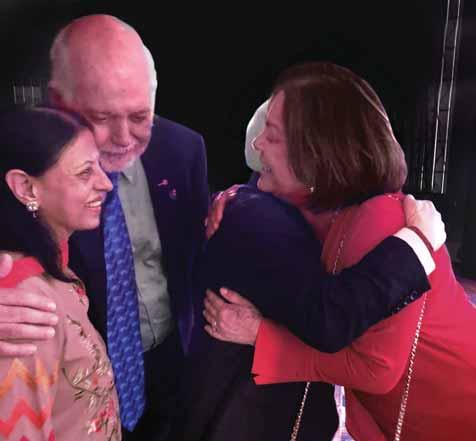
RIPN Sushil Gupta and Vinita came straight from Evanston to the Chennai Zone Institute, the first event where they were felicitated. Said Gupta: “I am overwhelmed and humbled by this reception; we’re coming back straight from our orientation in Evanston and I am still taking in the flood of information they were trying to give us in the last five days. And everybody at RI said: ‘Well you are drinking from the firehose; that is the term they use when so much information is being thrown at you! When I looked at my schedule for 2 years and 9 months, and it’s still not complete, being still a work in progress, I was stunned. But when I see President Barry and Esther sitting here so coolly, and so cheerful, I feel inspired and think we too can handle it!”
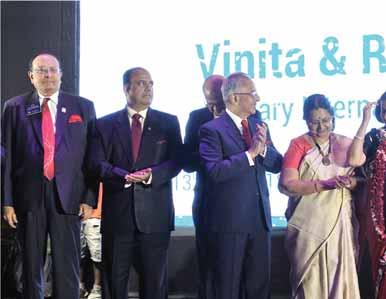

“he asked me what figure I thought we’d reach. When I said $16 million, he said ‘Trust me, we’ll be No 2 once again in contributing to TRF; don’t worry everything will fall in place.’
I had little hope but it happened; we collected over $19 million. This showed me his thorough knowledge of how Indian Rotary works!”
The RI Director recalled that when Gupta had visited his District 3000 two years ago, the serving DG was R Theenachandran, who took the RIPN to the Madurai Meenakshi temple. The latter looked around the place, found garbage lying all over and observed that not only Indians but
foreigners too visited this wonderful temple. Why not a Rotary club take it up as a project, let us show what Rotary can do to this city with such a lovely temple. RC Madurai Metro took up the cleaning project and within a month the whole place was cleaned up.
Also, till then D 3000 had been collecting barely $200,000 for TRF; Gupta said they should aim for at least $500,000 and “under the same DG we touched a record high of $572,000.”
Basker then added: “Former President of India Abdul Kalam has said that success is when your signature becomes an autograph. Today, your signature has become an autograph!”
Rotary has come a long way and has changed a lot over the years, and more so in the Foundation. Our service projects… all denote the great work all of you have been doing.
RI President Nominee Sushil Gupta
He has knowledge in a range of subjects. I’ve personally had so many interesting debates with him on Islam, particularly Shia Islam.
TRF Trustee Gulam Vahanvaty
Congratulating Gupta on his nomination TRF Trustee Gulam Vahanvaty referred to his skills in pranic healing and described his personal experience in being healed at the RIPN’s hands. “When he finished, he had taken on my ailment and I could see the tremendous amount of tension and sweat on his face. I have never forgotten that experience.” He also lauded Gupta’s “interest and knowledge in
a range of subjects. I’ve personally had so many interesting debates with him on Islam, particularly Shia Islam. With your qualities of head and heart, 2020–21 will be one of the best years in Rotary.”
At Chennai, Gupta’s batchmate PDG R Raja Ramakrishnan introduced him, and at Delhi, where all the senior Indian Rotary leaders participated, Convener of the event PDG Vinod Bansal and DGs Subhash Jain (D 3012) and Vinay Bhatia (3011) felicitated Gupta.
Amidstthe training sessions and serious talk on the future of Rotary, the Chennai Institute had its lighter and memorable moments too. Here’s a bouquet.
Ravi Shankar’s plain speaking
The cynosure of all eyes at the Institute naturally was the man who has recently donated `100 crore to TRF — President of RC Bangalore Orchards D Ravi Shankar. Smashing all stereotypes of the pomp, show and often a chip on the shoulder some mega donors display, this donor delighted the assembly with his sense of humour and plain talk, packed with punches. Referring to himself as a “half-baked Rotarian”, Ravi did not pull his punches, when in a Q&A session with D 3190 DG Suresh Hari, he touched upon the ostentation that he often sees in Rotary.
Coming down harshly on the installation of district governors, he said he had seen that during such occasions, flowers were showered from helicopters or the dignitaries rode on elaborately decorated elephants. As Rotary’s motto was ‘service above self’ such acts “make me wonder where is the element of service here?”
Auctioning a Merc
Ravi Shankar also stunned the audience by announcing that the “luxury car” he owns — nothing less than a Mercedes Benz — has been of little use to him. He said that recently his wife Paola pointed out to him that while they used their SUV all the time, the Benz he had bought sometime ago, was simply lying unused at home.
“So with her permission, I have decided to auction the car, and give the proceeds to TRF. It is a beautiful car, which has done barely 3,000 km….
Referring to RI Director C Basker describing him as “a chip of the old block” as his father too had donated all his land to Vinoba Bhave’s Bhoodan movement, Ravi Shankar said: “I am nothing in comparison to my father, who didn’t even bother to check the price of the land before he gave it all away.”
Then he pitched a googly to the women participants: “We find that sometimes when the husband wants to do something good, the wife wants to stop him… my appeal to the ladies, when your husband wants to do some good for society, please don’t stop him!”
Flowers galore
After RI President Barry Rassin and Esther were welcomed at the Institute with huge rose garlands, which seemed to weigh a ton, and it was Rassin’s turn to make the inaugural speech he said, tongue firmly in cheek: “I have to tell you Director Basker that you’ve put me in a bad position because right now I have more flowers on me than I’ve given Esther in 10 years!” Then, striking a serious note he told the delegates: “You have an amazingly powerful and strong group of zones and I hope you appreciate the kind of leadership you have amongst you. My President when I was DG was Raja Saboo and with him and Usha, I first saw leadership that was humble and yet so strong and powerful that you’d want to spend your life following that model.”

“Then I also worked a little with Kalyan Banerjee when he was Chairman of the Trustees and I saw him in action; I managed to get him to the Caribbean so that we could learn from him. Then I had the honour of being aide to Ravi (K R Ravindran) and Vanathy. Wow, I had to run at twice my usual pace just to keep up with him! Appreciate who you have in your zones.”
Referring to the “upcoming leadership”, he added: “Then you have Sushil Gupta. I sat on the Finance Committee with him and saw him in action; I can tell you that you are going to have a great leader! And there is your director and a group of past and future directors. You have such strong leadership; I urge you to appreciate that, learn from them and I thank you for the service you do in your zones, which you should be proud of.”

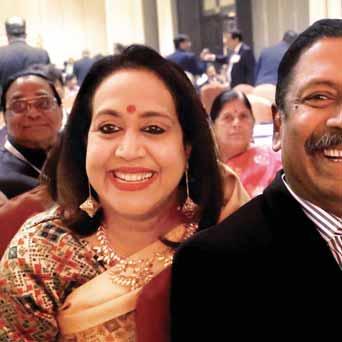


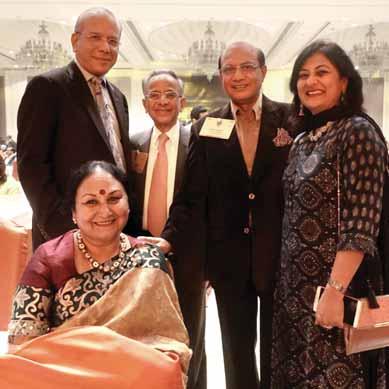






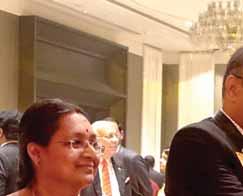
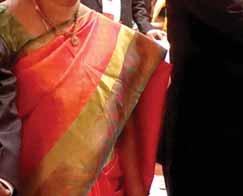



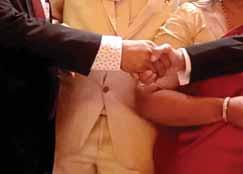
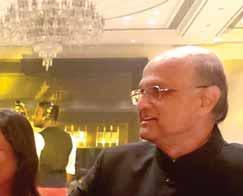
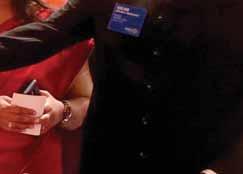



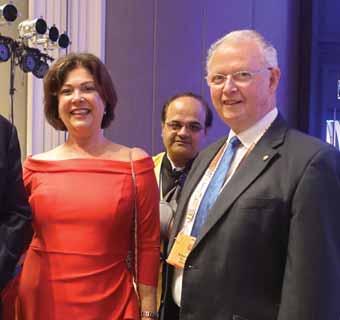



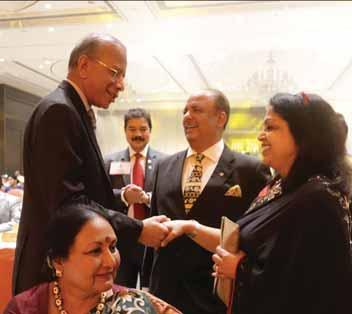
K R
and PRID Shekhar Mehta. Vanathy Ravindran and PDG B M Sivarraj are



Kiran Zehra
Rotary Club of Pondicherry Beach Town, D 2981, conducted a public awareness event to understand and resolve some of the pressing concerns faced by modern-day parents and sensitise them on child and adolescent sex abuse. Following the continued gang rape of an 11-year-old, hearing-impaired child in Chennai by 16 men and the rising crimes against children, the club “wanted to address the burning issues faced by parents and children alike in this age of smartphones and social media hype,” says the Club President Jigar Patel.
Five speakers addressed over 1,000 parents on topics ranging from child abuse and how to deal with it, smartphone addiction, and how to raise a ‘happy child’. Says Patel, “While it is

uncomfortable, this is an important subject every parent has to discuss with their children. This is about helping the child understand the ‘stranger’ he/she might already know. Statistics state that 90 per cent of the time when childhood sexual abuse occurs, it is someone that you know and trust. We wanted to give the parents the message that you cannot trust anybody with your child.”
This new-age parenting event also offered tips on how to cope with the unique challenges that parents face today. As a parent, Patel says that he realised that “yelling at your child doesn’t make you look authoritative. It makes you look out of control to your kids. It makes you look weak.”

A common mistake, he says, that most parents make is assuming that they know exactly what their children want. With both parents involved in their careers, “we prefer to give them a mobile phone and stop them from crying rather than having a conversation with them. It has come to a point where children cannot sleep without watching a video or playing a game on the smartphone. In an attempt to making parenting easy, we have only made it more complicated.”
A video to highlight the importance of polio immunisation was also played for the parents.
As a follow-up of the event the club plans to reach out to more schools in the region and conduct more awareness programmes.

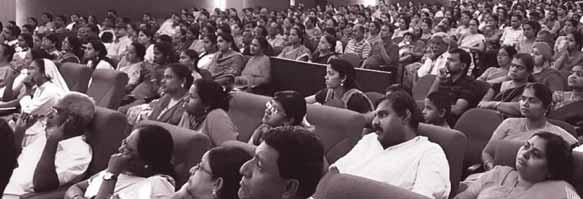




During one of their trips to Bangladesh a group of Rotarians saw on a door frame leading into the office of Dr Razuel Haque these words: “There is no limit what a man can do if he doesn’t mind who gets the credit.”
“And so when Arch Klumph decided in 1917 to accept endowments for the purpose of “doing good in the world, in charitable, educational or other avenues of community progress”, doing good in the world has become
the TRF motto, said TRF Trustee Mike Webb at the TRF dinner hosted at the Chennai Institute to honour major benefactors of the Foundation.
“The first donation to TRF was $26.50 by RC Kansas City. Would Arch Klumph have dreamt that the Foundation he started would today have a value of over $1 billion? There is no limit to what a man can do if he does not mind who gets the credit.”
But, he added, the crucial thing is to always involve others and train them
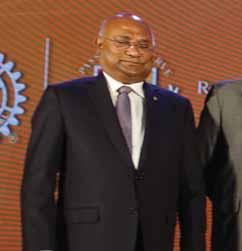
to eventually take over because there is nothing such as “an invisible man.”
To illustrate this Webb quoted from a poem:
“Sometime when you’re feeling importantsometime when your ego’s in bloom. /Sometime when you take it for grantedyou’re the best qualified in the room. /Sometime when you feel that your going would leave an unfillable hole. /Just follow these simple instructions, and see how it humbles your soul. /Take a bucket and
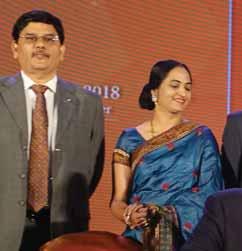
fill it with water, put your hand in it up to your wrist. /Pull it out and the hole that’s remaining – is a measure of how you’ll be missed.”
Most effective charity Webb, who heads the Finance Committee in TRF, said the Foundation was ranked by various agencies as amongst the most effective in the world. Congratulating Indian Rotarians, “for the contributions you make and the grants you undertake in these zones,”

he said for the second year running India has been ranked No 2 for donations last year. “But this has been achieved with only 70 per cent of clubs in these zones making a contribution; think what could be achieved with a contribution from every club. I encourage you to ensure that happens.”
Zones’ TRF landmarks for 2017–18
18 new Arch Klumph Society members bringing the total to 90 4,400 Major Donors, amounting to 14 per cent of TRF Major Donors
Record year for Zone 4 with over 133 major gifts contributed Zone 5 was ranked No 7 out of all 34 zones worldwide for having a record 193 major gift contributions
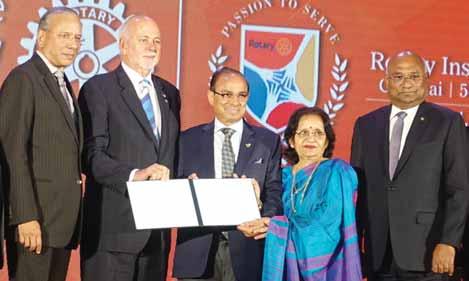
Zone 6A also celebrated a successful year with 2,157 new Paul Harris Fellows and 20 new Benefactors, a record for the zone.
Last year, TRF gave 503 district grants totalling $28.5 million and 1,300 global grants totaling
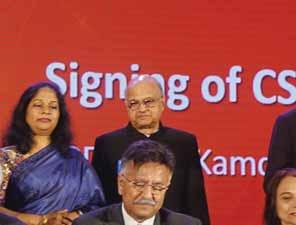

$86.3 million “and I know many of those grants have been wisely used in these zones,” Webb added.
As TRF was in its second century of service, more than at any other time, the Four-Way Test, originally proposed by Past RI



President Herb Taylor in 1943, and considered “a yardstick and guide for our business and personal actions”, had become important today. “With the many examples these days (in the larger community) of the flouting of regulatory provisions, the use of privileged information, human exploitation and many cases of financial impropriety, both large and small, we in Rotary need to be vigilant. We need to set an example and pass on
Would Arch Klumph have dreamt the Foundation he started would today have a value of $1billion? There is no limit to what a man can do if he does not mind who gets the credit.
TRF Trustee Mike Webb

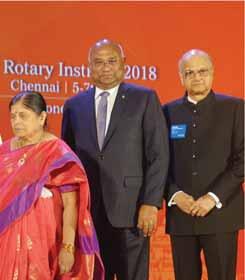
the message to others, in particular to young people in our communities, and we must lead by example.” In short, the Rotary badge must inspire trust.
Webb said TRF functions on high ethical standards, “and to ensure there is confidence in our donors, the members of the TRF Cadre of Technical Advisers ensure through audit and review that our funds are spent effectively.”
Congratulating the assembled donors, RI Director C Basker said, “We are here to celebrate your generosity and incredible support to TRF, which you have chosen as your charity of choice. Thank you for your contribution which has helped us to address critical problems across the world.”
These problems were phenomenal; every day
1,000 children die due to water-borne diseases. Over one million people have no access to healthcare, over 600,000 women die every year for lack of healthcare; almost 45 per cent of the world’s population lives in extreme poverty. “For the third consecutive year, our zone was No 2 in TRF giving for which let’s congratulate the DGs of 2017–18.”
Both Basker and TRF Trustee Gulam Vahanvaty thanked RC Bangalore Orchards President D Ravi Shankar and Paola, for their gift of `100 crore to TRF.
For three years our zone has been No 2 in TRF giving. Let’s congratulate the 2017–18 DGs.
RI Director C Basker
Vahanvaty said our zones had played a role in TRF getting a record collection of $414 million. India was again No 2 with $19.2 million, and “Bangladesh surprised us all with its total giving of $1.2 million, and District 3281 alone added four new AKS members.”
Motivated by his friend DG Suresh Hari, Ravi and Paola had given the second highest donation to TRF after the Gates Foundation. He is a simple and humble human being with a vision to help the community, said Vahanvaty.
This has inspired others too; “I was in D 3011 for their TRF fundraising dinner. The goal was $1 million; we ended with a commitment of $2.5 million!” Till Sep 2018, in three months, the contribution to TRF from India is $3.6 million against $1.7 million in the same period last year. Taking into
consideration the recent steep fall in the Indian rupee, the amount collected is `25 crore, against `11 crore last year; an increase of about 125 per cent.
PDG J B Kamdar and Marlene (they have reached the mark of $500,000); Rtn Jitender Gaur and Usha; Rtn Ravindra Reddy and Sarala Devi, along with other AKS members, were honoured at the TRF dinner.
EMGA Ashok Panjwani said both the pace and quantum of giving from our zones was increasing. Of the 887 AKS members in the world, “we have roughly 10 per cent at 88, of which 47 have come in the last three years, which is roughly 50 per cent. We are progressing very fast and every year we may now get 50 new AKS members.”
Pictures by Rasheeda Bhagat
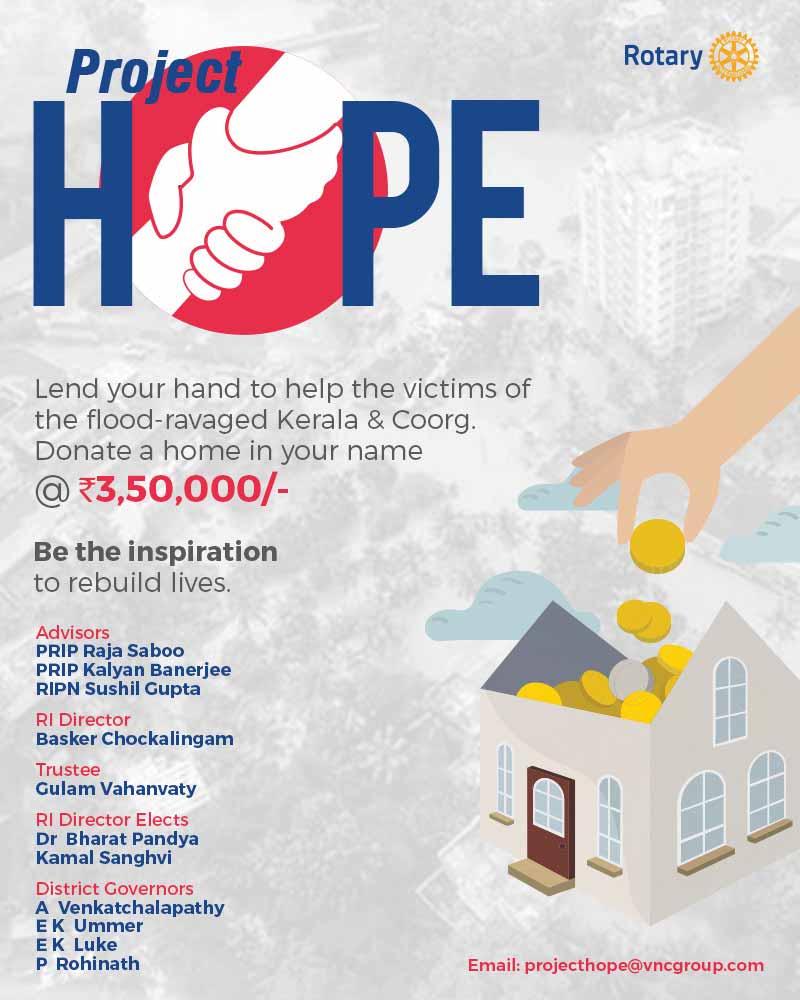

Adistrict polio workshop, along with a training programme for club presidents and secretaries, titled Parivridhi , was organised by RC Moradabad Central, D 3100. RIDE Dr Bharat Pandya was the chief guest and he urged the district leadership to expand membership and reach out to communities with impactful projects. Giving a bird’s-eye view of Rotary’s medical projects across the world and how this had ushered in better healthcare for needy communities, he said, “new members have to be retained and they should be well-connected with Rotary projects. We should project a good image of Rotary for better reach in the community.”
Briefly touching upon the pioneering role of Rotary in eradicating polio from India, INPPC Chairman Deepak Kapur said the NID camps had made a big difference in making India polio-free.“We had to overcome stiff resistance from certain pockets where religious sentiments proved a

hurdle,” he said. Now, Rotary’s focus has extended to fighting rubella and measles which are claiming several lives in India.
DG Deepak Jain listed out the on-going programmes of the district. Credit for the success of the event was given to District PolioPlus Chairman PDG Rajeev Rastogi. Over 45 clubs took part in the seminar. Specially-designed ID cards were

distributed by Pandya to members of the host club. The card displays all information about a member including their Rotary ID numbers and these can be used during foreign trips too. With the present membership at 52, Club President Anujj Agarwal aims to increase it to 65 by the year-end.
Other service programmes
An awareness camp on cervical cancer was organised with the help of Interact Club of the Aryans International School in Moradabad. It benefitted 250 girl students. Gynaecologists and cancer specialists explained preventive steps against cervical cancer and shared information on other health issues such as anaemia and menstrual hygiene, said Agarwal. Free haemoglobin tests were conducted and girls were educated about special tests like Pap Smear for detection of cervical cancer. In another event in partnership with the CL Gupta Eye Hospital, an eye check-up and ENT screening camp was held for around 170 inmates at the Moradabad district jail.
As RI President Barry Rassin raised a toast to celebrate the 90th birthday of Rotary Club of Colombo, D 3220, at a grand and elegant banquet held at Hotel Hilton Colombo, he began his address recounting some of the great humanitarian projects done by this heritage club.
“In 1948, you put together an association to prevent tuberculosis. Imagine, way back in 1948 you said: ‘We can help to rid this country of this disease.’ In 1987 you started an anti-narcotic association and waged a war against drugs. You partnered with Rotarians from Japan to get 2,000 intensive care beds to
hospitals across the country. I am from the healthcare industry and know how much a hospital bed costs and how much a good bed helps in the patient’s recovery.”
Getting a CAT scan for a hospital, rebuilding a modern maternity hospital destroyed by the 2004 tsunami, which had since then delivered


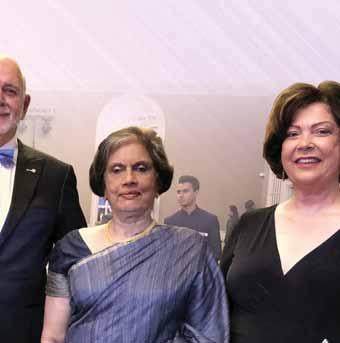
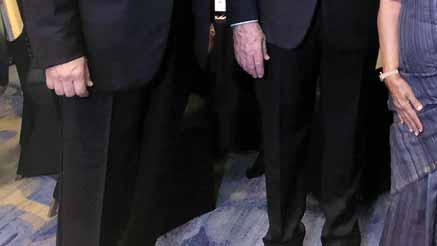
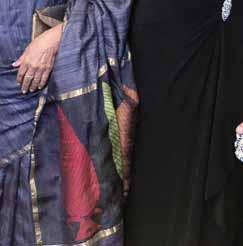




140,000 babies, and now launching projects to get the country rid of cervical cancer and a pilot to eliminate dengue from Colombo, were all projects that “are transforming your country.”
He was amazed to see DG Dushan Soza’s enthusiasm with the distribution of mosquito traps to eliminate dengue at its source and would be keenly watching the project’s success as many other countries with a similar or worse dengue problem could benefit from its replication.
“Nobody dreams like Rotarians but we… you actually… make them come true. There is an expression in Africa that if you pick up a rock, you touch the past, when you pick up a flower, you touch the present, when you touch a life, you change a future. Think of

Imagine, two toilets for 1,000 children, but that 11-year-old in Malawi appreciated that they at least had that, and that Rotary put them there. He thanked me and I pass on his thanks to you for all that you do.
RI President Barry Rassin
how many lives you’ve touched and how many futures you’ve changed… hundreds and thousands of people have better lives because of RC Colombo. They don’t know how and what you are planning next. On behalf of them, I am here to say ‘thank you’.”
Striking a reflective note, Rassin said that for 113 years Rotarians across the world had done small and big projects. But it needed to now plan for the next 100 years. While Rotary had done the Herculean task of bringing down the number of polio cases from 350,000 a year in the 1980s to only 18 so far this year, “it’s still 18 children. We’re not finished yet and have to fulfill the promise we made to the children of the world in 1985. We’ve got to stay the course and continue to immunise 250 million children every year. We can’t take our eyes off the goal.”
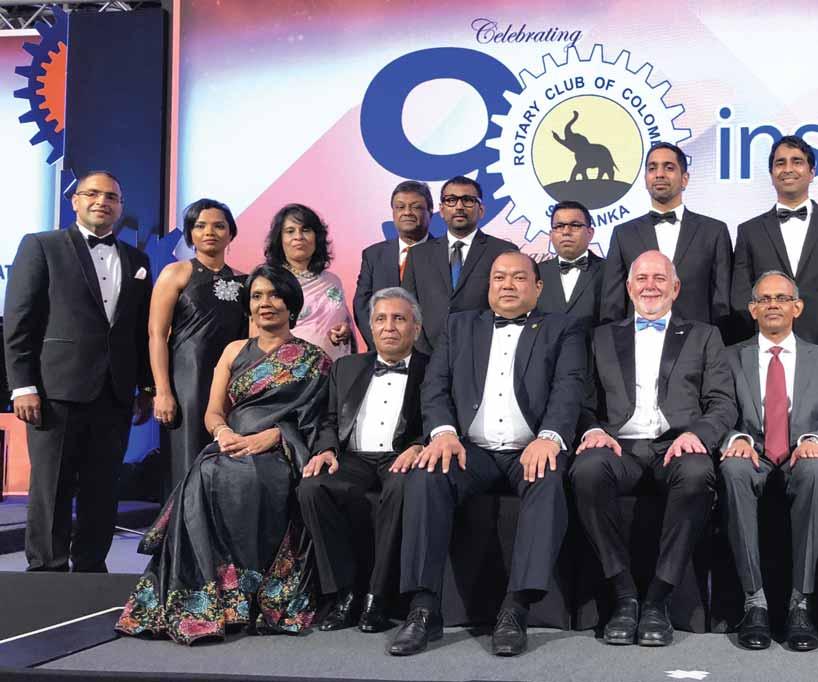
But while that remained Rotary’s No 1 priority, planning for the future was another major one. Explaining the various parameters that had gone into his theme Be an inspiration, the logo of which was designed by his wife Esther, who had captured the magical colours of the Bahamas’ beaches, waters and sunsets, which she felt represent joy and happiness, Rassin said the theme logo had a wave. “A wave is a force of nature, and Rotary is just that; a force out to make a positive change. Under

the wave is a heart and that denotes that Rotary has a heart, and then there is a sail, which sets the direction. So the logo says we are a force of nature with a heart that has direction to make our world a better place. But that direction comes from you… every Rotary club in the world.”
Their task and challenge would be to make Rotary relevant for the young and women as well, and to ensure that the less than four per cent conversion rate of Rotaractors into Rotary made a dramatic improvement. “We have to
ask if my Rotary club is knocking on the doors of my community and saying I want to be part of what you’re doing? If it isn’t, what do we have to do differently so that we can truly be the organisation that people want to join?”
Rassin added, “In some countries, I won’t mention names, the average age of Rotary is 70! That scares me; we need to bring younger people into our clubs to reduce our average age. And we can do that by being attractive and relevant to younger people and giving them value. If we offer that
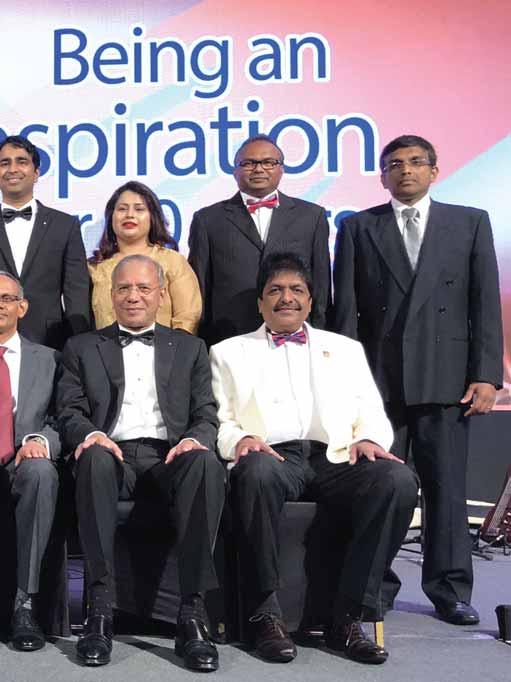
value, we won’t have people dropping out”, as 150,000 members had done last year.
One way of giving value to the young was by giving them personal leadership skills. Saying that he had got his “leadership skills from Rotary and not an MBA, Rassin recalled how the first time he was asked to deliver a speech by his club he couldn’t get to turn the first page. “But my club said that’s okay, do it again! And again! And I kept doing it until today I can stand before you and make a speech. Every Rotarian should have that same opportunity.”
To help the young develop leadership skills, Rotary had tied up with Toastmasters International to design leadership programmes with content from Rotary, and this would be first launched for Rotaractors.
Rassin ended his speech with a story from the couple’s recent visit to a school in Malawi which had 1,000 students and only 38 teachers. “Visiting that school I suddenly realised I had lost Esther, which I often do!” He finally found her in one of the rooms, amidst “200 children. There were no tables and chairs and yet the children were still happy that they could at
When I consider the ways in which my life would be this Rotary club, I realise how much poorer I would be; not in achievement, friends, and everything that is worthy and worthwhile.
Past RI President K R Ravindran

least get an education. A youngster, 11 or 12, comes up to me, points to my Rotary pin and says I know that people in local Rotary clubs put a well, so that we had water to drink. And then they built two toilets, so that we have toilets to use.
Imagine, two toilets for 1,000 children, but he appreciated that they at least had that, and that Rotary put them there. He said I also know they didn’t do it by themselves, they had help from people in other countries. I know I am never going to see any of them. But can you please tell them thanks from me?”
An emotionally charged Rassin added: “On behalf of that 11-yearold… I don’t know his name… I thank you for everything you do for all those children out there. They’ll never see you and you’ll never see them… whose lives you’ve touched and changed, the women you’ve provided education to so that they could educate their families, the thousands you provided sanitation to, the entrepreneurs you equipped with micro credit… All these things you do add to our basic mission, which is to bring
in world peace and understanding. For all this, I thank you.”
Striking a nostalgic note on his 42-year-old association with RC Colombo, Past RI President K R Ravindran responding to the toast to his club by the President, recalled as a 24-year-old walking in for his first club meeting with his proposer, when the President W Crossette-Thambiah, Vice Chairman of the Swiss group A Baur & Co, “introduced me, to my horror, to the guest speaker.”
Now only the previous day, while he was with his wife and a group of friends at the pub, in the Oberoi Hotel, the singer they had requested to sing the famous Hebrew song Hava Nageela , made popular by Harry Belafonte, initially turned down the request, pointing to a gentleman seated across the room, saying: “He is the Representative for Palestine.”
In some countries, I won’t mention names, the average age of Rotary is 70! That scares me; we need to bring younger people into our clubs to reduce our average age.
RI President Barry Rassin

“Nonetheless, we compelled him to sing that song. The other guest who complained stared at me, and promptly walked out! The Representative for Palestine was now the guest speaker at our club where I was going to be inducted as a new member.” To add to Ravindran’s discomfort, the President sent him a chit during the meeting asking him to propose the vote of thanks!
“I could have gone through the floor. And that was the first ever speech (if you could call that stammering effort a speech) I made in my life!”
But he never looked back, and when he considered the ways “in which my life would be different today if I did not join this Rotary club, I realise how much poorer I would be; not in money perhaps, but in affection, in respect, in achievement, in friends, in everything that is worthy and worthwhile. I might, of course have had a larger bank

Even as Rotary Club of Colombo celebrated its 90th birthday at a glittering event where RI President Barry Rassin raised a toast to the wonderful projects done by this vintage and illustrious club, and where former Sri Lankan President Chandrika Kumaratunga made an appearance, PRIP K R Ravindran educated the audience on the history of Rotary in Asia.
Thanks to the “venerable gentleman from Canada, James Wheeler Davidson of the Rotary Club of Calgary, who was charged with the responsibility of spreading the message of Rotary in the Asia Pacific region,” Rotary had blossomed into its present position in the continent.
Davidson, an Arctic explorer and a journalist, was a Director and Vice President of RI and was given the assignment of extending Rotary in the Pacific, Asia and Far East with a modest budget of $8,000 from RI. But he spent $25,000 of his own funds. Rotary had already entered Asia via the Manila Club (which was shut down and then restarted), Shanghai (also shut down) and Calcutta clubs in 1919;
account, but I would still be a smaller person” without the club “which has become an extended family for many of us”.
Ravindran regaled the audience with juicy titbits on his club’s history. Such as a clever classification maneuvering done by the then Classification Committee Chairman Rev Nathanielsz. A member wanted to propose the Bishop of Colombo to the club, but the problem was that the
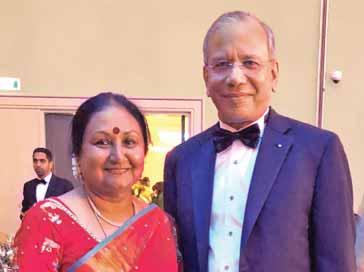
Tokyo in 1921 and Seoul in 1927. But it had never spread beyond Calcutta for almost 10 years.
Then between 1928 and 1931 Davidson started Rotary clubs all over Asia; Seramban and Kuala Lumpur in Malaysia; Colombo; Madras and Karachi in 1929. RC Colombo of Ceylon was part of District 89, which extended up to Afghanistan and Burma.
At the inaugural meeting of RC Colombo held at the iconic Galle Face Hotel, Col T Y Wright was elected President, amidst

committee chairman himself held the ‘Religion’ classification. “So he gave himself the classification ‘ReligionRetail’ and the Bishop the classification ‘Religion - Wholesale’!
The quality and high profile of the club’s membership could be gauged from the fact that several trunk roads in Colombo bear the names of its
a distinguished gathering of Colombo society, including the Governor General of Ceylon Herbert Stanley representing King George V, and the Commander of the 7th Fleet, Admiral Thesigar. “The standard for the quality of membership was set that day; not too long ago potential members had to wait three years to be admitted as there was no classifications available.” Of the 64 charter members of the club, only eight were Ceylonese and the rest were all Englishmen.
members — Sir James Pieris, Sir Mohamed Macan Markar, Sir Markus Fernando, Sir Baron Jayatilleke, Sir Chittampalam Gardiner, etc, Ravindran added.
Over the years, their club had carved a niche for itself in the Rotary world for “the quality and calibre of the humanitarian projects we do which in monetary terms run into millions of rupees, and have made a tangible difference to this country over the
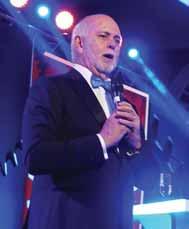
The rapport, bonhomie and mutual respect that RI President Barry Rassin and Past President K R Ravindran share came to the fore at the grand 90th birthday bash of RC Colombo. Beginning his address Ravindran quipped, “Barry and I have worked very closely when I was RI President; he would clean up the problems I created and
my success as President was to a large extent because of the support I had from Barry! And Mike (TRF Trustee Mike Webb, who spoke before him) was so right. Esther is the wind beneath his wings.”
Ravindran then went on to describe the nuances and different shades of Rassin deciphering the various moods and the approval barometer of his wife Esther thus: “When Esther says ‘Honey, Darling, or Love’, Barry knows he is on the right track. When Esther says ‘Barry’, the President knows I better watch out. But when Esther says ‘Rassin’, he knows he is in trouble. She is absolutely wonderful!”
Rassin, in his address, said, “In my humble opinion, Ravi and Vanathy were the best first couple this organisation has had. It was a great learning experience to spend time with them and understand leadership.”

years, touching the lives of thousands of people.”
Some of these were:
The 45 houses rebuilt in the cyclone-devastated Mannar district
Supporting the formation of the Ceylon Cancer Society
Setting up a national organisation to combat tuberculosis and helping control of the disease.
Setting up SLANA — the foremost anti-narcotics agency in Sri Lanka
Constructing an OP ward for the Lady Ridgeway Children’s Hospital
Gifting kidney dialysis machines for the general hospital
Equipping every government hospital, including the Army hospital, with motorised beds for their ICUs
Rebuilding a complete maternity hospital in the South after the 2004 tsunami
Setting up the early cancer detection centre which had already screened approximately 40,000 women.
Its latest work in progress is to eliminate the incidence of cervical cancer in Sri Lanka in a bid to become one of the first countries in the world to achieve this feat.
Through such projects, in the last 90 years, Ravindran added, “we have shown that Rotary is a place where people go, not to make their living, but to make their contributions.”
pilot launched
Addresing the meet, DG Dushan Soza said he had seen “Rotary change over the years; the fact this club has lived on for 90 years is a credit to all our leaders.”
He then gave details of the dengue pilot that was launched the same morning in the office of the Mayor of Colombo, Rosy Senanayake, with President Rassin inaugurating the project. “This morning we have signed an MoU with the Health Ministry as we need to eliminate the source of dengue at the larva stage through mosquito trapping equipment. And we can’t walk into people’s homes, without the government as our partner, to set up those traps.”
Another important programme the district was doing was a series of leadership seminars in collaboration with Toastmasters International to discover emerging leaders throughout the country.
TRF Trustee Mike Webb and Alison participated in the celebrations where several Rotarians, including Ravindran and Cabinet Minister PDG Swaminathan, who have completed 40 years in RC Colombo, were honoured.
Past President Ruzly Hussain who was Secretary of the club in its 50 th year when RI President Clem Renouf visited them chaired the meeting.
RC Colombo President Kumudu Warnakulasuriya thanked the participants, particularly Co-chair of the event Rtn Nithi Murugesu.
Pictures by Rasheeda Bhagat
Designed by N Krishnamurthy
Rotary International South Asia Office, Pullman / Novotel Commercial Tower First Floor, Asset No 2, Hospitality District, Aerocity (Near IGI Airport), New Delhi 110037
Rotary’s new learning centre is now live!
Log-in to My Rotary account, the Learning Centre is available under “Learning and Reference”. Participants can follow a learning plan to take a series of courses on a topic and earn virtual badges.
The learning plan includes updated material and manuals separately for club president, officers and for the seven other club positions. Lessons are available for club president, secretary, treasurer, membership, administration, public image, service projects, Rotary Foundation, club central committees and member recruitment strategies.
Attracting members through flexibility options
Post 2016 CoL, the following flexibility options are open for new members.
Dual membership in Rotary and Rotaract clubs: Rotaractors can simultaneously hold separate membership in a Rotaract club and a Rotary club. Partner with your Rotaract club and motivate them to join the main Rotary club. Interaction with Rotaractors will help understand the perspective of younger members.
Ability to change meeting schedules: Clubs can now vary their meeting days and times, and can cancel meetings, as long as they meet at least twice a month. Clubs can have in-person meetings, online meetings, allow online participation for an in-person meeting, or switch between any of these formats.
Attendance rules: Clubs may relax or tighten attendance requirements and termination policies for non-attendance. However, clubs must share attendance reports with the governor. Rule of 85: Rotarians can be excused from attendance if the combined total of their years of membership in one or more clubs plus their age equals at least 85, with their years of membership totaling at least 20.
E-clubs and Rotary clubs: The distinction between traditional clubs and e-clubs is eliminated. While references to e-clubs have been removed from Rotary’s constitutional documents, e-clubs can name and promote themselves as Rotary clubs that meet online.
Varied meeting options and flexibility in attendance requirements have a huge impact on recruiting members. A good exercise is to interview new members and ask them what they hope to do as a member. This will provide
unbiased information on what the members are looking for while joining Rotary.
Membership rules and qualifications: Clubs may determine their own rules for transferring members, dual and honorary members. The only mandatory qualifications for membership are that Rotarians must be adults who have demonstrated good character, integrity and leadership; have a good reputation in their business, profession and community; and are willing to serve in their community and around the world.
New membership types: Clubs may offer associate, corporate, family, or other membership. Clubs offering these additional types must report these members to Rotary as “active” for purpose of inclusion in the club invoice. Other financial obligations (club dues, meal costs etc.), attendance requirements, and service expectations for these members are determined by the club. However, only active members may be considered for office and count in determining a club’s voting strength.
CSR team has shared with district leadership, CSR documents that includes Reference Sheet and FAQs. For more details, please contact Jayashree Jayaraman, Manager, CSR and WinS, The Rotary Foundation, RISAO at jayashree.jayaraman@rotary.org.
Rotary Foundation Month
November is Rotary Foundation month. Here are few things you may like to do to ensure your November events are a success:
Educate Rotarians about Foundation’s history and its impact on families and communities, share Rotary’s work on your social media channels, publicise grants projects that can become inspiration for others.
Promote Foundation programmes such as Paul Harris Society and Every Rotarian Every Year and encourage every Rotarian to support TRF’s Annual Fund every year.
Recognise and thank new Major Donors and Paul Harris Society members.
Thank Rotarians who gave to the Foundation for the first time ever.
Encourage non-contributing clubs to “give” to the Foundation.
Reach out to members who gave last year but have not given this year — thank them for their past support and invite them to contribute again.
Encourage Rotarians to contribute online.
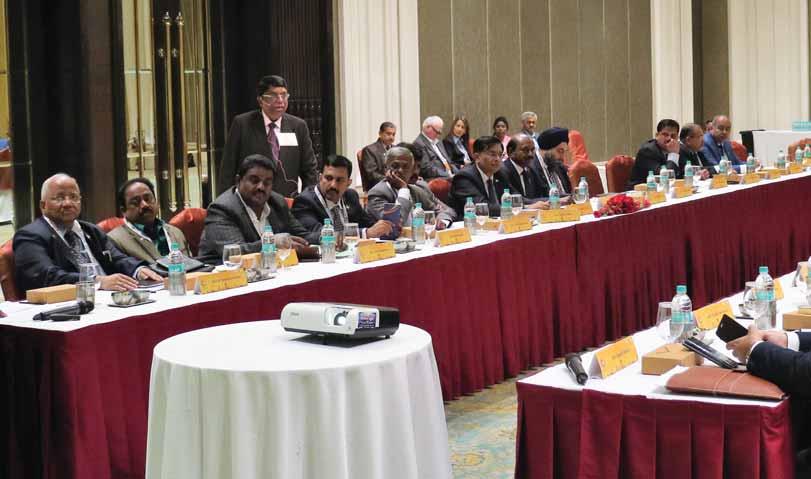

harpen the saw to learn new skills, align core competencies of your team for synergy, look for win-win situations in your clubs, and prioritise activities for better management,” advised RI Director C Basker to the 40 DG Nominees from Zones 4, 5 and 6A at the training seminar held in the run-up to the Chennai Zone Institute.
Listing out the dos and don’ts during their ‘waiting period’, he said that the governors are chosen two years ahead to give them sufficient incubation period during which “you can plan and set your goals by first observing the district projects, activities and understand the system.” As governors they unite people and win their confidence “to accomplish goals and in
the process, your credibility will go up. But unless you prepare diligently, you cannot accomplish much,” he said.
Basker urged the DGNs to adopt a proactive attitude and “be the inspiration to carry the entire team and clubs with you by networking and leading your district with passion.” He cautioned them to be careful in selecting for their teams trustworthy members with proven track record in Rotary’s six focus areas. He suggested the DGNs bring out their district directory at least two months ahead of taking office.
In an interactive session on Strategic Planning, RIDE Bharat Pandya said only a vision accompanied by work will chart out their destiny.
“We need to make our clubs vibrant with service activities and for that we must identify and plug their weaknesses.”
Referring to Rotary’s new vision statement: Together, we see a world where people unite and take action to create lasting change across the globe, in our community, and in ourselves, Pandya said, “We must have out-ofthe-box and lateral thinking to increase and diversify membership by creating new channels effective from July 1, 2019.” He urged the future leaders to have regular brainstorming sessions to understand, analyse the strengths and weaknesses of their districts and revise their growth strategies accordingly.

Speaking on the Art of Training District Leaders , RIDE Kamal Sanghvi pointed out that continuous training is indispensable to keep the organisation competitive. Topic-based seminars (Foundation, membership) have their own dynamics, but it is role-based training sessions — PETS, GETS, DTTS and DTA — that merit closer scrutiny as they are involved in shaping Rotary leaders.
“The more you practise, the more confident you become. Here, the facilitators and trainers play a key role in encouraging club participation, building consensus from diverse views, sustaining high-energy levels among members, and act as catalysts to project a good Rotary image in the community,” he said.
Speaking on TRF giving, PRID Mike Webb, Chair of TRF’s Finance Committee, highlighted the fact that the Foundation’s net assets rose to $1.127 billion in June this year from $1.058 billion in June 2017.
He recalled TRF’s vision to create a grand endowment fund of $2.025 billion by 2025 and to realise this objective, he called upon Rotary clubs to contribute generously to the Foundation.
Addressing stewardship issues, TRF Trustee Gulam Vahanvaty warned that because of “a miniscule number of individuals, out of 1.4 lakh Rotarians in India, indulging in shenanigans, we are earning a bad name.” He added that Rotary funds should be used in a responsible and transparent manner with good governance and maintenance system.
While India ranked number two in TRF giving, second only to the US, there was a “big gap between the top two ranks which should be closed.” Rotary had received $373 million as TRF contributions in 2017–18 and has set a goal of netting $380 million in this Rotary year, and this includes the Polio Fund of $150 million (including Gates Foundation’s 1:2 grant); Annual Fund of $137 million; Endowment Fund of $61.5 million; and global grants and outright gifts of $31.5 million. “Unlike in the days of matching grant projects where one or two Rotarians were involved in their implementation, we have ensured the involvement of the whole club for better fiscal management and community benefits as part of best practices,” said Vahanvaty.
PDG Raewyn Kirkman, D 9930, from New Zealand, suggested that clubs must show flexibility on issues such as attendance, meeting schedules and membership cost to attract women members. “Make them feel comfortable in Rotary club meetings by extending a friendly platform to them to share their ideas and network with their peer groups.” South Asia zones (4, 5 and 6A) with 10.19 per cent of women
membership compared to RI’s 22 per cent (in NZ it is 25 per cent) have to do much groundwork to remedy their skewed gender ratio, she noted.
Earlier, D 3232 PDG J B Kamdar, in his presentation on ‘Data collection and processing’, said 66 per cent of Rotarians exit in the first two years of their membership, hence “mentoring and hand-holding are critical for retention.” With charts, he showed that Zone 4 had a maximum of 107 per cent growth in the last five years, followed by Zone 5 with 78 per cent and Zone 6A had the least growth at 24 per cent. The growth in the last Rotary year has slowed down considerably across the zones, he noted.
RID Eun-soo Moon in his presentation on Rotary in Korea said the weekly club meetings were made interesting for youngsters with expert speakers invited to share their knowledge. “During my tenure as Governor of D 3620, I converted my office into a project monitoring room which yielded results by creating a record number of new clubs, additional members and more funds for TRF,” he said.
Zone 5 EMGA Sam Patibandla urged the DGNs to devise a strategy to identify struggling clubs in their districts. “Form a district leadership team with feedback from PDGs, the IPDG and club presidents. Ensure that your clubs are registered at My Rotary and their leadership plans are uploaded at Club Central for sharing.”
Seminar Chairman R Theenachandran said membership retention, which is below 70 per cent in South Asia, is important. Unlike earlier, when the DGN period was regarded as “honeymoon years”, the scenario has changed now as “Rotary is expecting a lot from you and “you have to live up to the exacting demands with planning and strategic vision,” he said.
Picture by K Vishwanathan

Highest Total Contribution to TRF3141
Prafull J Sharma
Highest contribution to Annual Fund 3141Prafull J Sharma
Highest contribution to Endowment Fund 3141 Prafull J Sharma
Highest Per Capita Giving to Annual Fund3141 B M Sivarraj
Highest contribution to Polio Fund 3141 T K Ruby
Nitish Laharry Trophy Highest Giving to Annual FundPrafull J Sharma 3141
Binota and Kalyan Banerjee TrophyHighest Giving to Endowment Fund Suresh Mathew3211
Usha and Raja Saboo Trophy Highest Giving to Polio FundAsha Prasanna Kumar3190
Usha and Raja Saboo Trophy Highest Total Contribution to TRFPrafull J Sharma3141


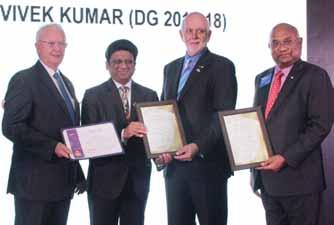
Highest Total Contribution to TRF3000P Gopalakrishnan
Highest contribution to Annual Fund 3232R Srinivasan
Highest contribution to Endowment Fund 3211Suresh Mathew
Highest Per Capita Giving to Annual Fund3232R Srinivasan
Highest contribution to Polio Fund 3190Asha Prasanna Kumar
Highest Total Contribution to TRF3292Sanjay Giri
Highest contribution to Annual Fund3250Vivek Kumar
Highest contribution to Endowment Fund 3291Brojo Gopal Kundu
Highest Per Capita Giving to Annual Fund3250Vivek Kumar


New inductees to Arch Klumph Society
3012 J K Gaur and Usha Gaur
3150 Ravindra Reddy and Sarala Devi Marri


RC Coimbatore Metropolis is quietly infusing fresh hope into burns survivors while giving them a new look and better confidence to face the world.

Today if I can see my daughter smile and be happy I owe it all to Dr S Rajasabapathy. To me and my family, he is God. He gave life to all of us,” says Anuradha, speaking of her 10-year-old daughter Eashwari who had undergone a reconstructive treatment a month ago. The child’s
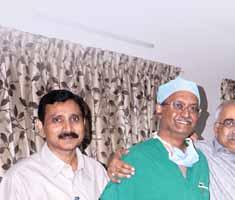

face was burnt and disfigured, her forehead bald and fingers were stuck together when she was brought to the hospital. She had survived a fire accident when she was just 18 months old. “Since then many doctors have treated my child but none could do any better, until a month ago God brought me to this doctor.”
From L: Tharun R Shah, Dr S Rajasabapathy, Project Chairman Ramesh Veeraraghavan, Project Coordinator Vijay Kumar, RCCM President K K Chugh and Rtn C J Narayanan at the Ganga Hospital, Coimbatore.
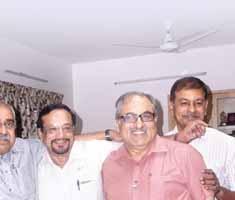


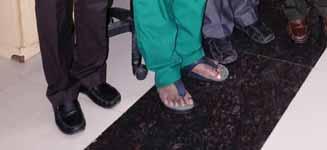
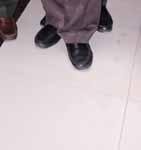
Anuradha is a resident of Dharmapuri, a small town in Tamil Nadu. Eashwari discontinued her schooling after Class 2 as she had to depend on someone for all her chores. She was identified and brought to the Ganga Hospital in Coimbatore by Rotary Club of Coimbatore Metropolis (RCCM), D 3201, of which Dr Rajasabapathy is a member. He is also the Director of the Hospital and the Head of its Plastic Surgery wing. After a series of six surgical procedures, most of the hand and some fingers that were buried in her forearm were liberated. She could now eat and write with her hand. “We have also reduced the bald patch in the scalp for which she is very happy. Eashwari is now confident of going back to school and resuming studies,” says the surgeon.
The club, along with the Project Coordinator Dr Rajasabapathy, has thus provided a second life to 395 such burn survivors through their flagship project — Hope after Fire — being carried out at the Ganga Hospitals since 2012. The project value so far is $408,000. While the patient is charged nothing, the club takes care of the hospital expenses and the consumables, while the hospital contributes by waiving the surgeons’ fees and other professional charges.
“Most of the fire accident survivors wish they were dead rather than alive and face societal rejection and other untold misery. Disfigured and deformed, they battle depression and
in the older people, the challenge of earning a livelihood persists,” says the surgeon. But with right treatment such disfigurement can be corrected, he says confidently. But it requires more than just one sitting, and a lot of patience and spirit. He points out that following a series of surgical reconstructions, the patients are able to return in a much better shape, and more importantly, able to use their limbs to do productive work.
The doctor highlights the improvements done on Nancy (23) who after a burn developed severe fixed contracture of both the knees, besides contractures in the elbow and neck. After two years of misery, she was referred to the club by Rotarians of RC Ooty. “It was a huge challenge to straighten the legs as there was circumferential scarring and tightened vessels.” After four and a half months and a series of surgical releases and grafting and a further eight weeks of painful rehabilitation, Nancy today is able to walk independently. “People thought it was a miracle. It cost us `4.75 lakh,” he says.
So was the instance of Kavitha who was badly burnt after being set afire by her husband. Her life was saved but face and hands were severely deformed. With multiple procedures,

Kavitha now faces the world with confidence. “We taught her tailoring and got her a sewing machine. Today she has a good clientele and is even planning to adopt a child,” says past president Tharun R Shah.
It all started when Dr Rajasabapathy and the then club president Venkatesh were on a return flight from Kolkata where they had gone to receive the Global Service to Humanity Award for the doctor. A discussion to do some meaningful project which will

make a social impact led the doctor to suggest that they could embark on performing corrective surgeries for burn deformities. Unaware of the magnitude, Venkatesh agreed and began working on the formalities for the project to take off. “Two patients and their treatment outcome cemented the support of our members and today every member is deeply involved with this noble cause.”
Two musical shows and a matching grant worth $50,000 have helped tide over the initial phase. Now the project has adequate sponsors to take it forward. “We don’t miss any opportunity to ask anyone for funds and we have never returned empty-handed,” says Club President K K Chugh.
“Each patient we have treated has a story to tell. But when we see the transformation and the immense joy the cure gives the patient and the people surrounding him, it is then we realise the power and magic of Rotary,” says Dr Rajasabapathy. Hope after Fire has been shortlisted recently for the British Medical Journal’s South Asia Award and he is hopeful of winning it. “Publicity is good for us. We want to reach out to more people from anywhere around the world,” he says.
Let us first realise the beneficial impact of peace in ourselves first and then we can promote it around the world, said RIDE Dr Bharat Pandya stressing the importance of Rotary’s Peace Centres which focused on conflict resolution for a better world.
He was speaking as chief guest at the two-day multi-district peace conference titled Symphony hosted by District 3150 in
partnership with D 3132, 3160, 3181 and 3182 in Hyderabad. RIDE Kamal Sanghvi cited his life experiences to point out how Rotary projects and service activities have brought harmony across communities in the world. All sessions turned the spotlight on Rotary’s six areas of focus and how they promoted global peace through a range of community projects.
Conference chairman PDG Jawahar Vadlamani and Secretary PDG C Suresh took care of the arrangements including
the logistics for the success of the conclave.
Focus Areas
Chairing the session on Basic Education and Literacy, PRID Shekhar Mehta said Rotary clubs were transforming the rural landscape with their TEACH programmes. The panelists comprising D 3190 DG Suresh Hari, PDG Prashanth Deshmukh, D 3131, and PDG Ravi Vadlamani, D 3150, spoke on the importance of fundraising, CSR projects, the role of e-learning in classroom education, and uplifting

school infrastructure for a holistic impact on basic education in the country.
The Water and Sanitation session chaired by PDG Ramesh Aggarwal, D 3012, discussed the nationwide WinS initiative. “Youngsters need to be educated and trained for the success of Swachh Bharat Mission. This will enhance their productivity by protecting them against diseases,” said PDG Regunath, D 3211. PDGs Ganesh Bhat and Jorson Fernandes were the other speakers.
EMGA Sam Patibandla chaired a session on ‘Disease Prevention and Treatment and Maternal and Child Health’. Rubella and measles were highlighted as the new challenges in healthcare. While PDG Sarat Babu, D 3150, explained how their Vision Project has transformed villages in Warangal district, PDG R Gopinath cited examples to show how their permanent projects in healthcare had a great impact in D 3160.
In another useful session on Economic
Development chaired by PDG Ravi Vadlamani, speakers — PDGs
Madhura Chatrapathy, D 3190; Deepak Pophale, D 3132; and DGE Ravee Dhotre, D 3131 — dwelt on the issue of empowerment through sustainable projects in the backward areas.
One of the highlights of the conference is the distribution of over 2,800 desks to 60 schools in Telangana under a global grant project. A peace walk at KBR Park in the heart of the city saw the participation of
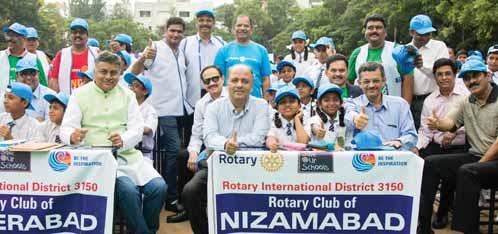
PDG Ravi Vadlamani, PRID Shekhar Mehta, RIDE Bharat Pandya and EMGA Sam Patibandla at the furniture distribution event.
nearly 800 Rotarians, Rotaractors, Interactors, Anns and Annets holding placards on Rotary’s six focus areas.
Summing up the takeaway from the peace
meet, host district DG Ramesh Vangala said taking care of the basic needs of food, shelter, education, healthcare and economic development of world
community would bring in lasting peace.
RC Greater Hyderabad was the host club and was supported by Rotary Club of Chandanagar RC Puram.
AnMoU was signed between Districts 3070, 3080 and the State Education department of Himachal Pradesh to revamp school education and upgrade related facilities under the ambitious project Samagra in the hill State.
D 3070 Governor Barjesh Singhal and PDG Dhian Chand representing DG Praveen Goyal, D 3080, signed the agreement in the presence of State Education Minister Suresh Bhardwaj and Department Secretary Dr Arun Sharma. Both the districts will partner with the Himachal government to “uplift and develop school education and other related facilities.”
“The agreement is the outcome of consistent efforts made by Dhian Chand who convinced the government that Rotarians are men of action and they mean business. And our success
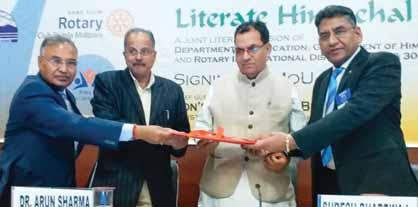
D 3080 PDG Dhian Chand (left) and D 3070 DG Barjesh Singhal (right) exchange MoU with HP State Education Minister Suresh Bhardwaj (second from right) and Department Secretary Arun Sharma.
in PolioPlus campaign is a testimony on that,” said PDG K K Dhir, D 3070, one of the project signatories.
Rotary clubs in both the districts will conduct field survey of schools and recommend upgrades in teaching standards. “The partnership will also revamp school infrastructure and
try to match it with those of private schools. The State government shall provide requisite funding to fulfill our objectives,” said DG Singhal.
DGN Davinder Singh, D 3070, Past AG S N Kapoor and AG Pankaj Daddwal, D 3080, were the other signatories to the Samagra Project.



There is so much in the compelling world of Alexander McCall Smith to ease the soul and gladden the heart.
It’s a grey morning. The sky is overcast and it seems as though the rain will come pouring down any moment, but of course, this is Chennai where the sun is fiercely protective of its territory, so you never can tell. Still, the air is cool, the neighbourhood is only just stirring to life. The time is perfect for a mug of piping hot Red Bush tea, exactly like Precious Ramotswe likes it. Really, there are few fictional characters like Mma Ramotswe, the brilliant detective of Alexander McCall Smith’s unusual series set in Gaborone, Botswana, about the No.1 ladies’ detective agency.
When my sister visited from London this past month, the best gift she brought me was a box of Red Bush tea. It’s red colour and earthy flavour are perfectly suited to my palate. Best of all, every time I take a sip, I am reminded of the innumerable unforgettable people created by McCall Smith, and the many places he has transported me to through the

imagination brought by the sheer lucidity of his descriptions. One time, he even had a crime fiction writer, Ian Rankin, whose books have an attraction of their own, walk down the street and into a pub in a book he wrote, set in Edinburgh — it may have been in either an Isabel Dalhousie novel, or in the series about 44 Scotland Street Whichever it was, it was exciting to catch a glimpse of a real live writer in a novel!
Born in Bulawayo, Zimbabwe, McCall Smith studied law in Edinburgh. While he was teaching at Queen’s University in Belfast, he entered a writing competition with a children’s book and a book for adults. The former won a prize. He taught law at the University of Botswana and was also professor of medical law at the University of Edinburgh. That should make it clear why these two places feature so prominently in his novels; he knows them intimately and his books convey his affection for
them. Wikipedia says he now lives in Edinburgh, in a house pretty close to the homes of J K Rowling (yes, Harry Potter!), Ian Rankin (well-known for his Inspector Rebus novels such as Knots and Crosses, The Hanging Garden, In a House of Lies) and Kate Atkinson ( Behind the Scenes at the Museum, Life After Life, A God in Ruins, Transcription ) whom I look forward to reading. McCall Smith’s various interests are reflected in his writings: Little Bertie who features in 44 Scotland Street , takes music lessons; Jamie, in the Isabel Dalhousie series, is a music teacher, he teaches bassoon; Isabel herself is a philosopher who ponders deeply on the question of ethics; people travel to far-off places, they tango with feelings and are tangled up in complicated relationships, some of them respect the environment, others are city creatures. There’s plenty to discover in McCall Smith’s books, there’s time to think and reflect, there are ‘occasion to savour’ moments and meaning, there are possibilities of considering your own life in light of what a character may have said or done or the circumstances the writer may

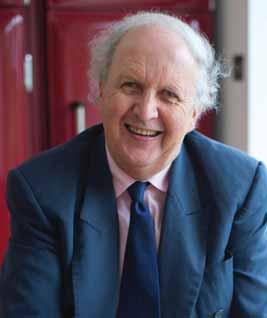

Every single one of McCall Smith’s books, no matter where it features in your list of favourites, speaks to the reader intimately, lyrically, clearly.

describe. Every single one of his books, no matter where it features in your list of favourites (almost all of them are up there, way high, in mine), speaks to the reader intimately, lyrically, clearly of lives lived and feelings felt.
Maybe that’s what moved the writer to purchase an uninhabited chain of islets in the Hebrides, called the Cairns of Coll, in 2014 — as pointed out by Wikipedia. Apparently he said, “I intend to do absolutely nothing with them, and to ensure that, after I am gone, they are held in trust, unspoilt and uninhabited, for the nation. I want them kept in perpetuity as a sanctuary for wildlife — for birds and seals and all the other creatures to which they are home.”
McCall Smith has several ongoing series, apart from the two mentioned earlier. There’s the Corduroy Mansions series about people living in an apartment building in Pimlico, central London; there’s the Prof von Igelfield Entertainments series; there’s a series for children about young Precious Ramotswe; then there are books about Harriet Bean, Max and Maddy, Akimbo, School Ship Tobermory; there are children’s novels, adult novels, academic texts and poems. No wonder he gave up teaching medical law to write fulltime!
He was also part of something called the Austen Project, initiated by publishers HarperCollins: this involved the rewriting of six of
Jane Austen’s famous novels by contemporary writers. Personally, I think this project was doomed from the start; who can possibly out-Austen Austen? McCall Smith took on Emma. He says it was like being treated to a box of chocolates, but for readers, I’m afraid, the chocolates were too bitter to relish. In a 2015 article called The Austen Fiasco?, Deborah Yaffe writes, “In place of fidelity-to-the-point-ofimplausibility, we get an Emma update written by someone who doesn’t seem to much like the original.” She goes on to say, “Here and there, McCall Smith offers glimpses of the playful, irreverent book he might have written. Emma paints Harriet in the nude, scandalising the Hartfield staff. John Knightley is a long-haired, tattooed fashion photographer who sweeps Isabella away on his motorcycle. The aging hippie Mrs Goddard passes out hash brownies at the Box Hill picnic. It’s not Austen, but as long as it’s entertaining in its own right, who cares? I’ll take a lively, lesbianthemed, pot-infused Emma over a blandly faithful imitation any day of the week. Alas, McCall Smith fails to milk his tantalising hints for their full comic or subversive potential… Where Trollope (Joanna Trollope: Sense and Sensibility) and McDermid (Val McDermid: Northanger Abbey) took their updating too seriously, following Austen’s template even when it didn’t
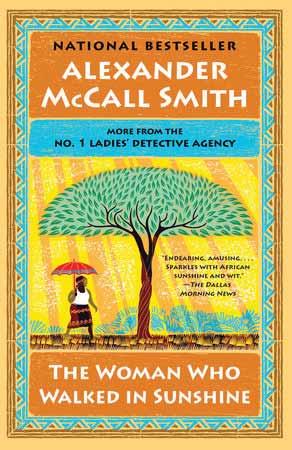

make sense, McCall Smith seems not to have taken his book seriously at all.”
Harsh, although some feel his is the best retelling of the retold versions. In my book, this is possibly the only ‘blot’ in McCall Smith’s prodigious output because I must confess, I didn’t take to it either. I found it boring, a word you would never use for McCall Smith. But that only makes him human, doesn’t it? And I know he is that because I met him a couple of years ago at The Hindu Lit for Life, in the author’s lounge, sitting quietly, reading a book. I couldn’t believe my luck. I took a seat nearby, then cunningly sidled up close and said, “Excuse me. I love your books.” He put aside his book, laughed and for the next hour we had the most interesting conversation.
I met him once in Chennai, told him “I love your books”. He laughed and for the next hour we had the most interesting conversation.

Even as I struggle and tussle with every word while writing this article, I’m not anxious because I know he’s tapping away at over a thousand words an hour trying to complete a new novel so he can fulfill the wishes of hungry readers such as myself crying out: Please sir, I want some more!
Designed by Krishnapratheesh


DGNirmal Prakash handed over a cart to the Sanarpudur village administration. It will be used to transport mortal remains of the dead to the crematorium for the final rites.
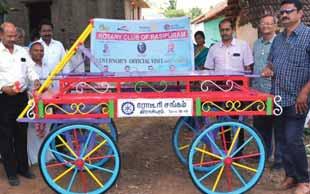
Rotarians visited the Mano Vishvalaya Old-age Home in the city and spent some time with the senior citizens staying there. They provided food for the inmates as part of the club’s annual Annapoorna Day project.

Anewtoilet constructed by the club at a public park was inaugurated by East Delhi Mayor Bipin Bihari Singh in the presence of DG Subhash Jain, PDGs Ramesh Aggarwal and Sharat Jain.
Interact
Club of Lakshmi School sponsored by the club organised a cultural fair to raise funds for Kerala flood relief. The Interactors raised `2.3 lakh from the event.
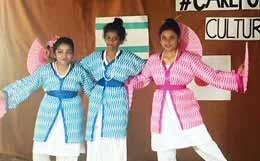
Over 50 senior citizens benefitted from a medical camp organised exclusively for them. A team of doctors led by Rtns Dr Narayan Arvikar and Dr Maya Arvikar screened the patients.

The Rotarians planted 2,500 saplings at Acharya Sushil Muni Charitable Hospital in Ajjowal village. DG Barjesh Singhal and Acharya Vivek Muniji were the guests of honour.
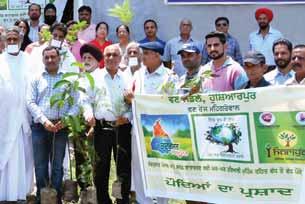
Rotarians pasted reflector stickers on trucks and heavy-duty vehicles as part of a traffic awareness campaign. Over 100 stickers were pasted at the event which cost `17,000.
The club undertook a WinS project at Srijan School in the city. A survey was done at the school to assess their requirements.

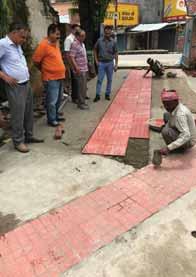
The club revamped a school premises and equipped the classrooms with computers as part of the Happy School project. The school management thanked the Rotarians for their thoughtful gesture.

Sports equipment was donated to a primary school in Mau and the students were given books and other stationery material.
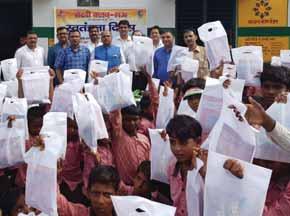
The club members donated 30 hearing aids to students at the Bombay Institution of Deaf and Mute, Mazagaon. An awareness programme on ‘good touch, bad touch’ was conducted for the students, in association with the Byculla Police Station.
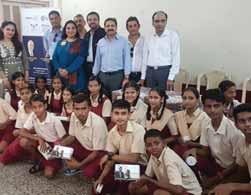
Club member Maanoj Harisinghani donated e-learning kits worth `14,000 to two schools in Bhiwandi. Six Rotarians sponsored the annual education of eight visually-impaired children.


The club, along with RC Sao Paulo Pacaembu, D 4610, Brazil; RC Nandyal and District 3160, sponsored desks for two schools in two villages.

Career guidance books were gifted to students of a government school by the club members. The objectie of these books is to help students make informed choices in selecting a career.
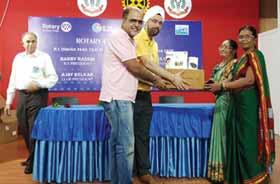
School uniforms were gifted to 40 students of SVST Primary School, at a cost of `24,000 and the Rotarians renovated a toilet block at a cost of `72,000 at the Ajjarakad Government High School in Udupi.
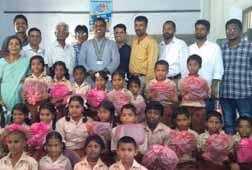
Atruck-load of flood relief material including food grains, gum boots, blankets, cleaning solution and clothing for women and children was sent to a camp at Edathua in Kuttanad district of flood-affected Kerala.
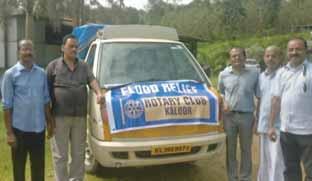
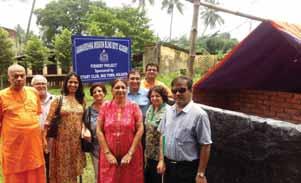
An eye check-up and cataract screening camp was organised at Jalaram Bhakt Mandal in the city. Over 120 patients including children were examined by a reputed eye surgeon.
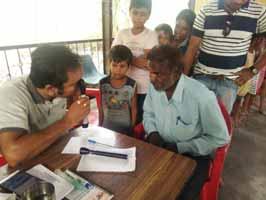
Atree planting drive was taken up at key places in the town including temples, bus stand and building complexes. The club members visited schools and encouraged children to participate in planting saplings in their schools.

Afish tank was donated to Ram Krishna Mission’s Blind Boys Academy at Narendrapur to provide vocational training in fish farming to the visually-impaired students at the institute. The project cost `40,000.
Last year, I got thoroughly irritated with a friend of over 50 years. He is a very forceful character, a perfect example of the Tamil proverb in which the protagonist says his rabbits always have three legs. He is also an excellent sportsman and represented his college and university at tennis, table tennis and football. But with age, he has turned to golf at which he has, as expected, excelled. Indeed, he worships golf and tends to carry on a bit about its wonders and virtues.
So I thought I would take him down a peg or two. You can imagine what his reaction was when I told him, partly to provoke an explosion and partly because I genuinely think so, that golf was a silly game in which you had to hit a stationary ball into a
Where is the skill in walking around on grass hitting a white ball with bent sticks, I asked? Why not play carrom instead? Or marbles? Same thing!
stationary hole. No other proper game is like that. Where is the skill in walking around on grass hitting a white ball with bent sticks, I asked? Why not play carrom instead? Or marbles? Same thing: stationary coin, stationary hole and even better, you are sitting down. Or, if all you want to do is to walk in pleasant surroundings, why not go to a nice park, why pretend to be playing something?
Look at cricket, I said, where a large ball comes at you at 100 miles an hour. It moves in the air. It bounces off the pitch, sometimes right past your ear. If it hits you in the wrong place you can be disabled for good. And instead of an iron stick you have a wooden paddle barely four inches across. You have to hit the ball with it to score runs. There are eleven guys trying to prevent you. Now that is where real skill is, I said, not in hitting a stationary ball into a stationary hole. Even badminton is better, the shuttlecock moves in all directions — or gilli-danda where the gilli is moving upwards in a twisting motion when you hit it. I then counted off all other games where skill was gauged by the ability to tackle movement.
Golf, I reminded him, has developed from something Scottish shepherds used to do while tending their

sheep — use their crooked sticks to hit stones. You can imagine how very bored they must have been. Hit. Walk. Hit. Walk. Hit Walk. I mean, how moronically monotonous. But you are a man of the world, well-heeled to boot, not bored at all, so why walk for miles in the hot sun and rain and sleet and cold winds to hit a small white ball with a big iron stick into a faraway hole in the ground marked by a flag? Not just that: what is the point of a fellow who follows you with your golf bag on his shoulder? Why have golf carts? I mean, how stupid is this game that is intended for walking but provides motorised transport on the field, or course, as it is called. If the idea is to network, I asked him, why go to all this trouble? How do people who don’t play golf network? And look at what you pay for it when you can do it for free on Facebook or Twitter or even good old Google Groups. All are same as golf, no special skill required because the keyboard is stationary as is the screen.
My friend, bless him, heard me out. There was no explosion. He didn’t insist on defending golf as I had expected him to. “I no longer argue with fools,” he said calmly. We are still friends. And he no longer invites me to his golf club.
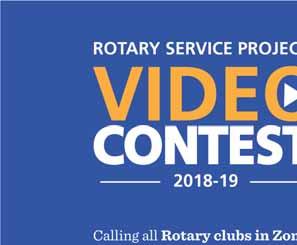
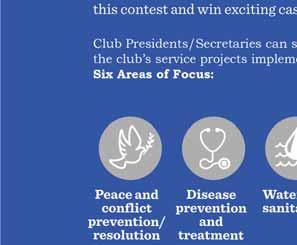
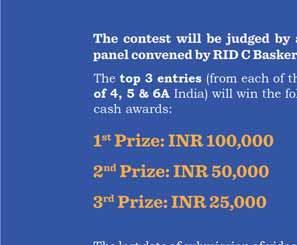

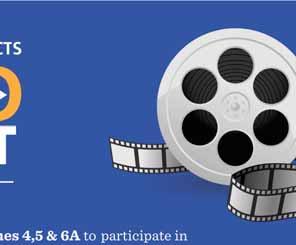

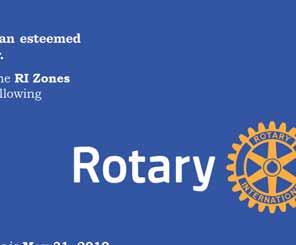



Regn. No. TN/CCN/360/2018-2020
Licensed to post WPP No.TN/PMG(CCR)/WPP-431/2018-2020
Total number of pages in this monthly issue, including cover, 84. Price: `35
Registered with Registrar of News Papers for India 3880/57 Rotary News Published on 1st of every month









